50 I Believe Essay Topics
To better train students on how to present their personal opinions on subjective matters, teachers will assign what is known as an “I Believe” or “This I Believe” essay writing assignment.
Designed to provide the reader with insight into the writer’s character, these essays are typically written in first-person point of view. The writer shares their beliefs on a particular topic – ranging from religion and politics to more personal subjects such as love and happiness – and offers supporting arguments for why they hold these beliefs.

The Challenges of Writing “I Believe” Essays
This type of essay prompt is a welcome break from more detail-oriented or researched-based writing assignments for many students. However, “I believe” essay writing assignments aren’t always easy.
It can be challenging for students to articulate their beliefs in a clear and concise way that isn’t argumentative or offensive to the reader. Students may also struggle to explain their reasoning behind these beliefs in a thorough and not overly simplistic way.
Despite these challenges, “I believe” essays can be an excellent opportunity for students to share their thoughts and feelings on important topics and learn more about themselves in the process.
Tips for Writing “I Believe” Essays
If you’re given an “I believe” essay assignment, here are a few tips to help you get started:
- Start by defining what it is that you believe. This may seem like a simple task, but it can be challenging to identify your core beliefs. If you’re struggling, start by jotting down a list of topics that are important to you – from politics and religion to family and friendship.
- Reflect on why each topic is important to you. Think about the reasoning behind your choices and how these reasons evolved over time. After all, your core beliefs are likely to have changed or grown since you reached adolescence.
- Determine which of your beliefs are the most important. Focusing on developing thought processes that support your beliefs. For extra help, consider sharing these thoughts with a trusted friend or family member for advice.
By reflecting upon your core beliefs and developing clear arguments to support them, you can craft a powerful “I believe” essay that will truly reflect your thoughts and feelings.
How to Write an “I Believe” Essay
To craft a well-written “I Believe” essay, students must forgo the typical essay structure of introduction, body, and conclusion.
Instead, the essay should be organized around a series of specific beliefs that the writer wishes to share. Each thought should be introduced with a clear thesis statement, followed by supporting arguments and examples.
The conclusion of the essay should wrap up the main points that have been made and leave the reader with a final thought to ponder.
Here is an example of how an “I Believe” essay might be structured:
Thesis: I believe that everyone has the right to love and be loved.
Argument: Everyone deserves to find love and experience happiness in their lives. This should not be limited by race, religion, socioeconomic status, or any other factor.
Example: I saw a video of a man proposing to his girlfriend at Fenway Park. She said yes and the crowd went wild! Now that is love. If they can find it, then so can we all!
Conclusion: Society should not stand in the way of love. Love is the most powerful force in the world, and we should all embrace it.
As you can see, the “I Believe” essay structure allows for a great deal of flexibility. Students can choose to focus on a variety of topics and can organize their essays in different ways. An “I Believe” essay can be an excellent opportunity for students to present their thoughts on important issues under a few simple guidelines. With a bit of planning and organization, this type of essay writing assignment can be a breeze!
What You Shouldn’t Do When Writing an “I Believe” Essay
To ensure that you are writing an “I Believe” essay and not another form of an argumentative or persuasive essay, avoid doing the following:
- Don’t provide evidence or use statistics to support your position – this is not an essay that calls for research.
- Don’t attack or criticize the beliefs of others – your goal is to share your own opinions, not to tear down those of others.
- Don’t go off on tangents – stay focused on the main points you want to make.
- Don’t speak objectively or in the third person – for example, don’t say “people believe that” or “studies show.”
- Don’t use filler words and phrases such as “I think,” “I feel,” and “it seems like.”
Use any of these 50 “I Believe” essay topics to help you brainstorm ideas for your essay!
I Believe Essay Topics About Life
- I believe that life is too short to spend time with people who bring you down.
- I believe that laughter is the best medicine
- I believe that we should make time for quiet reflection every day.
- I believe that the only thing that matters in life is love.
- I believe that we are all capable of change.
- I believe that it is never too late to learn and grow.
- I believe in the power of positive thinking.
- I believe that we should always be kind, even when it is difficult.
- I believe that there is no such thing as a coincidence.
- I believe in the saying “what goes around, comes around.”
- I believe that we are all responsible for our own happiness.
- I believe that the best things in life are free.
- I believe that it is essential to be grateful for what we have.
- I believe that it is never too late to achieve our dreams.
- I believe that we should surround ourselves with people who make us better.
- I believe that you can either love or hate something; there is no in-between.
I Believe Essay Topics About Education & School
- I believe that education is the key to a bright future
- I believe that children are our future and should be treasured as such.
- I believe that there is no such thing as a dumb question.
- I believe that schools should do more to celebrate diversity.
- I believe that homework is essential, but it should not be excessive.
- I believe in the importance of having a strong support system while attending school.
- I believe that standardized tests are not an accurate measure of a student’s knowledge.
- I believe that it is vital to find a balance between work and play while in school.
- I believe that everyone should have the opportunity to learn how to swim.
- I believe in the importance of recess and physical activity in students’ lives.
- I believe that there is no such thing as a bad grade.
- I believe that teachers deserve more respect and better pay.
- I believe that it is never too early to learn a foreign language.
- I believe that education should be free for everyone.
I Believe Essay Topics About Friends & Family
- I believe that family is the most important thing in life.
- I believe that friends are the family we choose for ourselves.
- I believe that it is essential to maintain close relationships with friends and family.
- I believe that there is no substitute for quality time spent with loved ones.
- I believe that family is not defined by blood but by love and commitment.
- I believe that we should spend more time with the people we care about and less time worrying about material things.
- I believe that it is better to have a few close friends than many superficial ones.
- I believe that it is healthy for friends to grow apart.
- I believe that competition between friends is healthy.
I Believe Essay Topics About Money
- I believe that money cannot buy happiness.
- I believe that it is essential to be happy with what you have, not what you want.
- I believe that people are more important than things.
- I believe that it is okay to splurge on something even if it means going into debt.
- I believe that it is better to give than to receive.
- I believe that money can’t buy everything.
- I believe that the love of money is the root of all evil.
- I believe in saving for a rainy day.
- I believe in investing in oneself.
- I believe in the saying, “money doesn’t grow on trees.”
- I believe that rich people should be forced to pay more taxes.
These 50 I Believe essay topics are sure to inspire your own original beliefs and help you create a powerful and unique essay. When writing your I Believe essay, be sure to focus on the beliefs that are most important to you and that you feel passionate about discussing. The best I Believe essays are the ones that are personal and reflective, so don’t be afraid to share your own thoughts and experiences.
Related Posts
- 110 Personal Essay Topics
- 140 Opinion Essay Topics
- 120 Argumentative Essay Topics
- 130 Informative Essay Topics
- 65 Explanatory Essay Topics
Categories:
- Essay Samples
- Essay Topics
- Essay Writing Guides
Recent posts:
- 170 Ethics Essay Topics
- 160 Satire Essay Topics
- 160 Rhetorical Essay Topics
- 155 Criminal Justice Essay Topics
- 150 Political Essay Topics
- 145 Classification Essay Topics
- 140 Sociology Essay Topics
- 140 Environmental Essay Topics
- 135 Controversial Essay Topics
- 125 Classification and Division Essay Topics
- 120 Literary Essay Topics
- 100 Profile Essay Topics
- 90 Heart of Darkness Essay Topics
- 80 Holocaust Essay Topics
Testimonials

53 This I Believe Essay Topic Ideas & Examples
🏆 best this i believe topic ideas & essay examples, 📌 most interesting this i believe topics to write about, ❓ this i believe questions.
- This I Believe: What Goes Around Comes Around – Essay I never did my homework and it became so hard for me to catch up with the rest in class. This was the time when I remembered the words of my grandmother “only fools rush […]
- Art and Creativity to Solve Problems I believe that art is the deepest expression of the society and the beliefs it underscores. I believe in the unity of the human race and bringing an end to racism and human trafficking.
- This I Believe: Making the Most Out of Time
- Discovery Can Be a Nuisance: This I Believe in Genetics
- This I Believe: Life and Creativity
- A Philosophy of Health Education: This I Believe
- This I Believe: Thomas Mann on Time and the Meaning of Our Existence
- This I Believe About the Care of Human Beings
- Acceptance and Respect for Beliefs Different From One’s Own: This I Believe
- This I Believe: Live a Life of Love
- Resources in Support of This We Believe
- The Personal Philosophies of Remarkable Men and Women: This I Believe
- This I Believe: My Positive Outlook on Life
- Activities of the Non-profit Organization: This I Believe
- Goals and Philosophy of This I Believe
- The Personal Philosophies of People From All Walks of Life for This I Believe
- Thought Provoking by This I Believe
- “This I Believe” About the Good Life: What It Means to an Immigrant
- Discussing This I Believe Topics in Public Places
- This I Believe: An Intermission From This Fast–Paced Life
- Writing Tips for This I Believe
- This I Believe- Type of Leader
- Shaping of Beliefs Through This I Believe Stories
- This I Believe: Positivity Is the Key to Success
- Uncovering Sources of Power From Personal Beliefs in This I Believe by Eve Ensler
- Using This I Believe in Common Reading Programs
- This I Believe: Self-Determination
- What Psychologists and Psychotherapists Say About the Program This I Believe?
- How Do You Begin an Essay for This I Believe?
- What Is the History of This I Believe Program?
- Is This I Believe a Real or Is It Scripted?
- What to Write for This I Believe?
- How Long Are This I Believe Essays?
- What Is the Greatest “This I Believe” Essay Ever Written?
- What Are Ideas to Write an Essay Starting in the Theme of “This I Believe”?
- What Is a This I Believe Speech?
- What Famous Peolpe Wrote Their This I Believe Essays?
- What Updike Wrote About in This I Believe His Essay?
- Why Jay Ellison Decided to Collect the This I Believe Essays Into a Book?
- What Is the Plot of This I Believe?
- What Experience Can Be Gained From the This I Believe Program?
- What Is the This I Believe Project?
- Can People From Other Countries Write to the Program This I Believe?
- How Much It Costs to Participate in the Program This I Believe?
- Is It Possible to Describe Bad Life Experiences in This I Believe?
- How Many Years Has the Program This I Believe Been in Existence?
- Were There Cases When People Described Crimes in the Program This I Believe?
- Does This I Believe Have Any Connections With National Suicide Prevention Lifeline?
- Has the Program This I Believe Ever Featured Stories About War or Refugees?
- How Does the Program This I Believe Help to Change Lives?
- What Is This I Believe Purpose?
- What Are the Most Popular Essay Topics for the Program This I Believe?
- Chicago (A-D)
- Chicago (N-B)
IvyPanda. (2023, November 8). 53 This I Believe Essay Topic Ideas & Examples. https://ivypanda.com/essays/topic/this-i-believe-essay-examples/
"53 This I Believe Essay Topic Ideas & Examples." IvyPanda , 8 Nov. 2023, ivypanda.com/essays/topic/this-i-believe-essay-examples/.
IvyPanda . (2023) '53 This I Believe Essay Topic Ideas & Examples'. 8 November.
IvyPanda . 2023. "53 This I Believe Essay Topic Ideas & Examples." November 8, 2023. https://ivypanda.com/essays/topic/this-i-believe-essay-examples/.
1. IvyPanda . "53 This I Believe Essay Topic Ideas & Examples." November 8, 2023. https://ivypanda.com/essays/topic/this-i-believe-essay-examples/.
Bibliography
IvyPanda . "53 This I Believe Essay Topic Ideas & Examples." November 8, 2023. https://ivypanda.com/essays/topic/this-i-believe-essay-examples/.
- Belief Questions
- Self-Awareness Research Topics
- Kindness Research Ideas
- Self-Concept Questions
- Mindfulness Research Ideas
- Television Ideas
- Media Analysis Topics
- Oprah Winfrey Topics
- Essay Editor
53 This I Believe Essay Topic Ideas & Examples
1. introduction.
So, you are confused by yet another essay type and are thinking about how to write a "This I Believe" essay. Look at the essay's "meat" to understand its main idea. When it comes to a "This I Believe" essay, look for a unique topic about personal beliefs. This topic does not necessarily need to be a religion because most often, we have been taught from our early stages to understand that "belief" has something to do with the "religions." But it is not for a "This I Believe" essay. At this stage of our lives, so many things have come into "familiarity" and "evidence" as we have matured; therefore, we have gone far away from being called as superstitious. However, gaining life experiences, we have encountered situations that put ourselves in one of the following conditions: gaining more credible evidence to support what we "believe in", been "distracted" by some misunderstanding and temptations. Or something actually "overturned" our "long time beliefs" - no matter what that would be. It has been general philosophy in life as well as, in any journey, we ever rule out the possible instance that we may need the help or supports from the "unseen forces" to be successful - in other words, we must believe in something that we do not know due to our narrow perception. Often, we hear people say, "I don't believe in anything" but I think that is not really true since we are always in a situation, good or bad, in which our response is not always under control. I think that people continue living is the evidence of trust and beliefs.
1.1. Definition of "This I Believe" essay
The "This I Believe" essay is an analysis project that explores the values and beliefs that shape a person's identity. It's quite distinctive. This piece of creative writing is about the topic that is given to us. One can find many "This I Believe essay examples" online, which can help in understanding the format and structure of an essay for different topics. The writer doesn't prove his thoughts, experience or taste; in a descriptive and creative work, the reflection of personal experiences and opinions can be dedicated to any topic. One can freely write about anything. This I Believe essay's project is to share a value or core belief, which is important to you. In accumulating a study all together in class, every student is to both offer his composing to the class and offer some feedback on his peer's work. It is necessary for the students to follow the provided rules and the given value or belief; the essays and feedbacks need to talk about the same value/belief, make sure the students are able to understand the essence and the outcome of the project. Also, a student can write "This I Believe essays" for money in the Internet; in fact it can be quite profitable, because there are different websites that offer this service. However, one has to be very careful with the websites; just because there is an opportunity to buy an essay, it doesn't guarantee best quality. Every essay is to be checked for quality. The general form of essays is the introduction, main body and conclusion. The "This I Believe essay" is no exception. It's a project which has the students formulate a statement of what their beliefs are. The "This I Believe essay" is a part of a project which engages students in speaking and writing. Every student will be able to share his thoughts and work. It's amazing how freely writing for the "This I Believe" project can help one express oneself. This project can be a powerful tool for confidence building. Students may find that having the opportunity to write and share their core beliefs gives them a chance to understand who they truly are and what is important to them. This kind of project is a great asset to all students, both physically and emotionally, as it can broaden one's horizon. From all this, it can be safe to conclude that "This I Believe essays" can really help people to be fully aware of their selves. Writing this sort of essay provides solid training to sharpen our critical thinking skills and help guide behavior in our thoughts; some might even apply what they have learned to a more objective point of view.
1.2. Importance of personal beliefs in shaping one's identity
It is a common English high school and college writing assignment. In it, you are assigned a belief and you have to write an essay and present it to your classmates about what you believe in. This could be everything from "I believe in the power of music" to "I believe in peace in the world." There are many This I Believe essay topic ideas for writing you could choose from. The essay is about personal beliefs. It is based on a radio program from the 1950s. It was a time of great cultural change and the program was designed to encourage listeners to share their beliefs with one another. To guide you through the process, This I Believe provides good guidelines that are meant to help. All of your work should be original. This is a reflection, so remember to include experiences that help you to believe, that are personal to you and help to illustrate your point. The common phrase "What doesn't kill you makes you stronger" appears to be ever so popular. If you're planning on writing about this topic for a This I Believe essay, take into consideration that the phrase has a cliche status. This particular belief is general and doesn't allow much room for growth. But this is counterintuitive to the purpose of the assignment. Instead, choose a different belief and write a This I Believe essay about that. You choose how the This I Believe essay fits in with your overall grade in the class. It could just be for practice; in a college writing class, practice could be a good topic, as could a general assignment, stressed and time management, understanding audience and purpose, and more. This kind of essay is generally written in a very strict and serious tone. It will be direct and to the point, but without being too harsh. A free essay can be a good resource for all types of writers and students. This is also the perfect time to read this kind of essay because it can help me decide which is best for you. I can look out for stories that will keep your readers engaged. And most of all, everybody has his or her beliefs. So the kind of topics for This I Believe essay we should avoid in writing are those that contain ambiguous narrative elements and poor validity of the personal beliefs.
1.3. Overview of the essay topic ideas and examples
After reading the study, I can say that in general, "This I Believe" essays really focus on life's practices and pay very little or no attention to traditional "Kolb learning style cycles," etc. It actually forces a particular manner of composing that is imploring, touching, persuasive, and personal. Because of the truth that personal phrases are far weaker than general statements, the writings do have a particular opinion on particular performance of suggestions or further analysis. Another critical factor is that contemporary life as a quick lifestyle actually makes people not want to think too much and replicate the life custom of yesterday. The "This I Believe" essays really ask college students to do something new. It forces folks to assume critically. So, the results that come from "This I Believe" essays might be placed in the category of learning. Learning is about change or change and it's associated with chronic improvement and adaptation. And change starts with thoughtful investigation. So these beliefs not only change from people to people but also commit "This I Believe" essays to the process of constructing, to the analysis and discovery of the ideas. Also, the teaching strategies for the "This I Believe" essays are also very useful because students can follow methods. Students will be "guided to prepare their own personal philosophies and to place them into dialog with wider public contexts and dialogue".
2. Section 1: Personal Values and Beliefs
The first section of This I Believe is focused on personal values and beliefs. The three essays in this section were inducted into the Library of Congress and material for This I Believe essays and related activities are published on the Web site. In the first essay, a father finds happiness sharing the life of his paralyzed son and living the "now", rather than worrying about the future. And in the essay about family, the author makes it clear how family can shape beliefs and values and in another, how friendships shape one's values. Overall, the essays of this first section provide a better understand about what are the beliefs or values then the later section of religions. And the message is also more positive in the section 1 essays, which is about the personal values and beliefs, while the section 2 essays on the whole are more about the social system than individual views. Also, in terms of religions, essays of different writers have different views to it. It could base on their own religious experiences or what they have obtained from the teachings. And many of the essays will focus mainly on the global and social problems instead of self reflections, as this kind of essays are mainly used for the students of different levels to have language practice and to learn knowledge, such as the ways to improve the writing. But the message implies in many essays would be the hope or the beliefs for a better life in the future. And for the author himself, as the organizer and also a writer of the essays, he thinks "hope is one of the greatest emotional support for making a thought of values and beliefs come true in life." He believes hoping for better life is a common thing among everyone, including people who may not be realized that what they are hoping for. And that's the reason why he puts "hope" in the name of the project. Because whatever we hope for could be anything for better future, and it seems like that's the value we are lived in and living for. Every individual experience is affected by the culture, values and belief. However, it is always hard for the parents to work out which method is the most suitable to apply. Some people believe that parents should teach children how to be good members of the society. While others think the society should be responsible for raising the children. If you want to have a writing on the topic ‘what is the most appropriate way to raise children in the today's society', visit our site for the This I Believe Essay Topics 2021. Every voice publish is highly welcomed. Thank you very much!
2.1. The role of family in shaping personal beliefs
Since God created humans based on His image, the person's family is the first social structure with a significant impact in shaping their world views. In most cases, it is the first and also the most enduring influence. Children at a young age do not have the ability to choose what kind of family to be born into. As a result, they are entirely dependent on their family for their material, social, and intellectual growth. From every aspect, the family's influence is far-reaching. For instance, the values inculcated by the family, as well as the role each member is expected to play, serve as the building blocks for society. Some of the common expectations are such as the father should be the breadwinner, the mother should be the one who manages the household, whereas children are the ones who need to listen to the parent and project a good image to the community. These beliefs are normally carried down from generation to generation, thus have a strong sustaining impact on society. In Chinese traditional families, the parents will decide what is "right" or "good" to be practiced. They will do things such as force their children to get married to someone who they think is the most suitable candidate for their children. In this case, the children have no say in choosing their life partner. Over time, the children, like the one mentioned above, will live through the culture of what the family believes. They might then pass it down to their children, and the cycle continues.
2.2. The impact of cultural background on one's beliefs
Secondly, many essay topic ideas are based on students' personal connection to cultural background, including traditions, customs, and even the social environment. This is obviously in line with beliefs because many, if not all, political activities treat culture as a value-laden phenomenon. Just as each type of political activity rests on a particular understanding of the concept of culture, each college, professor, or student's activity assumes some faculty of commitment to the claims of culture. This new trend seems to be the most popular one, even though I know an essay about cultural backgrounds and the impact of culture on personality has been around for a few years from now. I think this furthers the ongoing debate over the use of culture as either an independent variable that affects the beliefs and meaning of identity or as a dependent variable that may change the political and social structure of a cultural group. Also, technological advances in humans' understanding of genetics, as well as the impact of globalization, are some of the incontrovertible facts that challenge the traditional notions of culture and identity. Through researching different types of essay topic ideas, I have confirmed that knowledge produced by human beings as a result of culture changes the traditions, rituals, and religion as much as cultural background is shaped by the generation of technology. I am very impressed by this new kind of approach as it gets more and more people to consider the possibility and potential of progress and discovery in a culturally diverse society. Cultural diversity and the dissertation of the meaning of the plurality of realities and the possibility of growth and self-actualization choices, they are the good signs for improvement in human civilization. Ergo, globalization has had both positive and negative impacts on certain aspects of both non-Western and Western countries in helping to respect cultural traditions and values.
2.3. How personal experiences shape individual values
Secondly, personal experiences give us an opportunity to step out of the world we live in, to see life from a different perspective. American traditions are an important part of our country, and by living that tradition, we give our lives true meaning and value. For example, every year my family sets up our Christmas tree, and when setting up the tree we play Christmas music. My father will be in charge of the tree decorating and my mother will be in charge of judging the tree. This little family tradition has become something I have, and always will hold close to me. When I was young, I did not understand the value of the tradition. I saw people playing Christmas music as noise, and the way my mother judged the tree as something silly. However, after years of the same routine, I finally began to appreciate it. I realized that everybody in life, including myself, needs a little something to make them feel alive inside. For some people, it's painting, reading, or a family tradition that's true value is only known by the members of that family. Life is about exploring and finding out true values based on our experiences. I value what comes with tradition, and am grateful for the important role that tradition has played in my life.
3. Section 2: Social and Global Issues
Firstly, who doesn’t know the word "empathy"? Empathy is the ability to understand and share the feelings of another. How to understand why empathy is important in this situation? Well, the answer is simple but complicated. "In order for people to see that these are problems that need to be solved, they need to have empathy," said Rachel Pohl, an artist and educator from Whitefish, Montana. When we look somewhere or anywhere in the world, there are many different people and living things suffering from a variety of problems. However, why can't human beings solve these problems easily collaboratively? It is probably because people don’t care about others' problems even if they already know what these are. We can say it is really hard to encourage someone who doesn't care about others' or global problems to solve them. This is why empathy is important by showing others what someone may feel. That empathy for will let others get an understanding of a problem. Also, farmers have to use the belief of empathy towards their workers in the farming communities who labor under the heat of the sun and other natural challenges every day even though farmers may not consistently receive workers' respect and understanding towards the employers. As mentioned in Keith E. Whittington's essay "Teaching Religion and Politics", giving students the opportunity to cultivate empathy for religious worldview is the first step to achieving a fair and equal society, and this is also the way of initiating positive change in the world. He argued, "Empathy, the capacity to appreciate what it takes to hold a particular point of view, is foundational to a liberal education and is a key step on the pathway to developing the sophisticated moral imagination necessary for reflection on and coordination in the world." It is true that the power of empathy cannot be overlooked in today's complex global world full of continuing and emerging challenges. His argument enhances my belief in the importance of empathy not only in facilitating quality education in colleges but also in addressing social problems. Well, in order for people to see that these are problems that need to be solved, they need to have empathy.
3.1. The importance of empathy in addressing societal problems
Although our main goal for each of our personal belief essays will be to tell a personal narrative, what is a narrative essay? It is a type of paper whose primary job is to tell a story to the readers. Thanks to the active voice, the story feels compelling and engaging, carrying the reader along with the plot. Also, writers are to include the characters, setting, climax, and the conclusion of the story. Narrative writing is similar to novels, but they sometimes have specific rules for writing. These rules can vary depending on numerous aspects. However, to truly understand a lesson through someone else's eyes, empathy has been strongly effective. What is empathy? And how does it affect the world around us? Well, empathy is the ability to understand and share the feelings of another. This means that we could understand what other people feel and share what we feel. However, us humans can sometimes have the resistance to show empathy. But according to a good scholar, Jamil Zaki, he believes that empathy could be improved and taught. This is because the human brain is always adapting. So when people's lives are improved, the capacity for empathy has been growing. As Zaki suggests, in order to build a more empathetic society, we need to work together. We have to build the systems and communities that support people. And most importantly, we have to exercise our extraordinary potential for empathy and help our children. As a result, empathy is a crucial skill that has the capacity to transform individual lives and create a more just and caring world. James Doty, a great writer for Psychology Today, shared a story about a boy named Chris. Chris grew up in a horrendous environment, with a lot of abuse, both physical and emotional. Well into his elderly years, Chris demonstrated incredibly severe antisocial behavior, which led to many people feeling frustrated and trying to help him. Later on in Chris's life, something changed. Something changed him to be able to transform his life and find the potential of what he could do. That 'something' was encountering someone who showed Chris real empathy and real care. After going through the strong effects of empathy, Chris was able to understand other people and he started to develop meaningful, healthy connections with them. At last, Chris became a person who lived a fulfilling life, enjoying his life and helping others. This is the potential that empathy holds. It has such a strong effect that it has the potential to transform from a boy who lived in a devastating life to a grown-up man who finally found his place. It is simply magical how empathy could easily change someone's life. As Zaki argues, the capacity of empathy has been growing. People use empathy to improve other people's lives and reach out more to help. Chris's story strengthens even more the power of empathy. By that, we can share and value what we feel and then understand what other people feel too. Chris has shown that empathy is not just a skill but also a method to help transform people's lives and reach a place where we can truly be self-actualized. Not only that, we use narrative. We can truly understand that personally having life change to a certain degree based on the empathy that we experience. And most importantly, it could happen constantly. Chris's life example again demonstrates the power of empathy that has the potential to transform individuals' lives and has the opportunity to create a better world. Empathy is a special characteristic that can turn any of the personal beliefs into reality. It has the direct power to change all the negativity in the world to positive behavior. As mentioned before, empathy is learned and not an inborn characteristic. That's another essential explanation of why we must show empathy. The reason is that we all have the chance to learn the magic of empathy and understand others. These changes in psychology, emotional intelligence, or philosophy might start out just in an individual's mind, but eventually, it could construct a better world that is full of empathy.
3.2. The power of education in creating positive change
Education has always been a vital tool for shaping the world around us. It offers a better understanding of the workings of both individual minds and society as a whole. Educational systems across the world have incorporated "goodwill" as part of their education to promote moral values within the students. Through their education, they are able to learn the importance of "respecting others," "helping those in need," "being honest," and "making the world a better place." This is kindness in action! When knowledge is shared, it is doubled. A great saying goes, but when love and kindness are shared, they make an even greater impact. Furthermore, a good educated society, in turn, is more tolerant, which ensures social stability and unity. Through getting a good education and applying the knowledge and critical thinking in our constantly changing world, we can achieve success in both our personal and professional life. A good education is a platform for success and a weight that holds great significance in the world.
3.3. Examining the role of religion in shaping beliefs about social justice
One of the many social issues that I feel strongly about is social justice. Social justice is a concept of a society in which every human being is treated justly, fairly, and given an equal share of benefits, resources and services. In this society, unlike the society depicted in the book Of Mice and Men, there is no need for the marginalization of specific groups of people. Social justice is a necessity in a society in order to prevent a rift between the social classes. An example of social justice is the way the individual characters are treated by others in the society and the treatment given to the disliked "outsider" Curley's wife. Throughout the whole book, Curley's wife's name was never mentioned. This is due to the lack of respect and justice available for her, including her husband Curley as well. Curley and his wife gave the impression that they were of a higher social status than some other characters. As a result of that, they received more respect and were able to treat the other characters in whichever way they wished. This is unfair and wrong. The fact that even the women who agree to be with men (marrying Curley's wife) treat her with the same disregard shows that in that society, women are given a much lower social treatment, the women are always put down by the men. Social justice will be achieved when everyone in society shares the same values and enjoys the same protection by the law. It is my belief that all people should be treated as equals and that fair opportunity to succeed in life should be available to them. With a strong interest in history and decision making process in society and as a good communicator, I am convinced that I will pursue a career as a barrister that will give me the opportunity to serve people and to help the society to change for the better. "You never really understand a person until you consider things from his point of view - "until you climb into his skin and walk around in it," said by Atticus Finch in the book to his daughter, Scout. This is based on the sociological aspect of human's perception to the society. I want to make sure I know how to climb into the person's skin and walk around in it. The society should function in which people embrace each other's difference and whenever injustice does surface, someone should be motivated, willing and vocal in bringing change. Only then, social justice shall prevail. I believe that this aspiration is not only mine but many of us today and later will always be in pursuit of social justice not only for ourselves but for the whole community and the coming future. I have been equipped with the education of critical reflection on social work that this will help me to best articulate my service to people and the society in a more effective way. By the next ten years, I see myself being an active member of the bar. Now, is the beginning of the end." This is what my lecturer told us when I started my year one. Truly inspiring. It suggests to me that the journey of making social justice a reality is a long process but well worth the time sacrifices. This I Believe is an international organization engaging people in writing and sharing essays describing the core values that guide their daily lives. Over 125,000 of these essays, written by people from all walks of life, have been archived here on our website, heard on public radio, chronicled through our books, and featured in weekly podcasts. The project is based on the popular 1950s radio series of the same name hosted by Edward R. Murrow. By M.K.
Related articles
126 building topic ideas to write about & essay samples.
1. Introduction I am going to indicate how you can build good ideas to write about in English and then how you can develop or expand your ideas in English as demonstrated in the examples below of the transitional signals in italics. For example, if one of your ideas to write about is "Running is good," after having got that idea you can think to develop or expand your good idea saying why and how running is good. You can have this paragraph. "Running is good for physical and mental health for s ...
Concept of Recruitment Model in HRM Research Paper
1. Introduction Human resource management concept has come to be recognized as important in business management, becoming the discipline that effectively deals with human resources in a corporation. Human resource management refers to the function that specializes in every aspect of human power regarding employers. Recently, due to the large profits that corporations seek, there is a demand for specialized workers who are graduates of prestigious colleges, with skills and experience. This recog ...
Social Equality and Economic Growth Essay
1. Introduction In the study of economic growth, the integration of areas beyond standard concepts and models improves the evaluation of the process of economic development and allows for theoretical growth models to better reflect and incorporate the multidimensional nature of economic progress. Concepts such as happiness, health, education, environment, leisure, innovation, and capabilities are all dimensions that are important and explicit or implicit in the growth and interdisciplinary lite ...
Invention in Writing Essays - 551 Words | Essay Example
1. Introduction Invention in writing essays can be defined in two different ways. First, it is the enterprise of coming upon new ideas. This is the conventional meaning of the word; as a verb, to invent is literally to come upon, to find, or to discover. In this sense, invention is a synonym for origination. It is a matter of bringing forth something that one had not met with previously. Second, invention means the process of coming up with ideas - creating, shaping, forming, as well as arrangi ...
Constructivism in Learning and Teaching Essay (Article)
1. Introduction This topic page focuses on the educational uses of the theory of constructivism. It begins with a brief overview of the meaning of the term and some comments about the roots of constructivist theory. This is followed by a discussion of the importance in contemporary thinking about the nature of human knowledge and subsequent sections on constructivist theory. In the core section, we outline several of the key ideas of constructivism, primarily as they appear in the work of the m ...
Television Effects on Society - 1123 Words | Essay Example
1. Introduction The television is a two-faced object that has the capability of both good and bad things. It is a source of entertainment and education, stimulating the brain, teaching fame, and entertaining the bored. One of the most prevalent narratives of television's significance dictates that television helped to advance American civilization in the days following the Second World War. The television was a propitious medium to help the country deal with the problems of technological surge. ...
IQ and GPA of the Ninth Grade Students Correlation
1. Introduction Intelligence and academic achievement are two of the most common measures to appraise a student. It is also true that one of the major objectives of school is to allow students to improve and reach their maximum potential in both academic and cognitive disciplines. Some research studies indicated the same level of correlation between intelligence and academic achievement, though it is worth mentioning that several others have shown a different relationship between them. From the ...
The Search for Knowledge - 1582 Words | Essay Example
1. Introduction What is knowledge? Philosophers have grappled with the problem of defining knowledge for thousands of years. This search is caused, in part, by the fact that dictionaries, notwithstanding, the word is polysemous: it has more than one meaning. There are also the related puzzle of how to analyze the process of acquisition of knowledge and the perennial epistemological question of whether certain knowledge exists or whether people must be content with knowledge that is less than ce ...
Crafting Beliefs into Words: Top ‘I Believe’ Essay Ideas
Table of contents
- 1 70 I Believe Topics for Essays
- 2 This I Believe Essay Examples
- 3 Final Words
This article will explore a wide range of thought-provoking This I Believe essay topics that can inspire meaningful and reflective essays. They cover various aspects of life, values, beliefs, and personal experiences. What I believe essay is a unique form of personal essay that focuses on a single core belief of the writer.
- The article lists 70 thought-provoking topics that cover a wide range of subjects, including kindness, empathy, family, diversity, resilience, honesty, music, forgiveness, education, and many more.
- These topics are designed to inspire writers to find the theme that resonates most deeply with them.
- To provide insight into the style and content of these essays, examples from the project are shared.
70 I Believe Topics for Essays
Delving into the realm of personal reflection and expression, “I Believe” essays stand as a cornerstone for introspection and sharing the essence of one’s ethos. It is rather a popular task for students. Thus, This I Believe winner essays are a powerful medium to express your deeply held convictions, values, and experiences.
Below, we present 70 thought-provoking I believe essay ideas that cover a wide spectrum of subjects. Explore the following list and find the topic that resonates most with you:
- The Power of Kindness: Small acts of kindness can transform lives.
- The Importance of Empathy: Understanding others’ feelings fosters deeper connections and mutual respect.
- Finding Joy in Small Moments: Cherishing little things brings happiness in everyday life.
- Overcoming Fear: Facing fears leads to growth, courage, and new opportunities.
- The Value of Family: Families provide love and support and shape our foundational values.
- The Beauty of Diversity: Diversity enriches experiences, promoting learning and cultural appreciation.
- The Impact of a Smile: A simple smile can brighten days and bridge connections.
- The Strength of Resilience: Overcoming challenges builds strength and fosters personal growth.
- Honesty in Relationships: Truthfulness is the foundation of trust and strong relationships.
- The Influence of Music: Music transcends barriers, evoking emotions and connecting people.
- The Freedom of Forgiveness: Forgiving liberates from grudges, bringing peace and reconciliation.
- The Significance of Education: Education empowers, enlightens, and opens doors to opportunities.
- The Magic of Nature: Nature’s wonders inspire awe, offering peace and rejuvenation.
- Pursuit of Dreams: Chasing dreams adds purpose and excitement to life’s journey.
- The Role of Hope: Hope provides strength during adversity and motivates progress.
- The Wisdom of Age: Age brings wisdom, insights, and valuable life lessons.
- Overcoming Adversity: Facing hardships head-on builds character and resilience.
- The Gift of Giving: Giving enriches the giver’s soul more than the receiver’s.
- Embracing Change: Change, though challenging, is essential for growth and progress.
- The Power of Imagination: Imagination fuels creativity, innovation, and endless possibilities.
- Finding Purpose in Life: Discovering life’s purpose brings direction, fulfillment, and satisfaction.
- The Strength of Vulnerability: Embracing vulnerability leads to authenticity and deeper connections.
- The Healing Power of Laughter: Laughter heals, reduces stress, and promotes emotional connection.
- Self-Discovery: Understanding oneself is key to personal growth and happiness.
- The Importance of Self-Care: Prioritizing self-care is essential for wellbeing and balance.
- Learning from Mistakes: Mistakes are valuable lessons that guide future success.
- Embracing Creativity: Creativity expresses individuality and drives innovation.
- The Joy of Travel: Travel broadens horizons, fosters understanding, and creates memories.
- The Impact of Gratitude: Gratitude cultivates positivity and appreciation for life’s blessings.
- The Beauty of Solitude: Solitude offers peace, reflection, and rejuvenation for the soul.
- The Value of Friendship: Friends provide support, joy, and a sense of belonging.
- The Courage to Be Authentic: Authenticity requires courage but leads to genuine self-expression.
- The Gift of Time: Time is a precious, non-renewable resource to be cherished.
- The Power of Second Chances: Second chances offer opportunities for growth and redemption.
- The Importance of Mindfulness: Mindfulness encourages living fully in the present moment.
- The Influence of Role Models: Role models inspire and guide through their actions and values.
- The Joy of Giving Back: Giving back to the community brings fulfillment and joy.
- Embracing Diversity: Celebrating diversity leads to a richer, more inclusive world.
- The Strength of Community: Communities provide support, strength, and a sense of belonging.
- The Value of Perseverance: Perseverance through challenges leads to success and achievement.
- The Magic of Serendipity: Unexpected, fortunate discoveries add surprise and delight to life.
- The Significance of Humility: Humility grounds us and fosters genuine human connections.
- The Beauty of Simplicity: Simplicity brings clarity, focus, and appreciation for the essentials.
- The Importance of Compassion: Compassion creates empathy and understanding in relationships.
- The Wisdom of Experience: Experience teaches invaluable lessons and enriches decision-making.
- Overcoming Prejudice: Challenging prejudices leads to a more inclusive, fair society.
- The Healing Power of Art: Art heals, expresses emotions, and transcends cultural boundaries.
- The Influence of Literature: Literature expands minds, stirs imagination, and reflects societies.
- The Freedom of Expression: Expressing oneself is fundamental to individuality and democracy.
- The Impact of Technology: Technology revolutionizes lives but requires mindful usage.
- The Joy of Parenting: Parenting, while challenging, is immensely rewarding and transformative.
- The Role of Faith: Faith provides comfort, guidance, and a sense of belonging.
- The Value of Honesty: Honesty builds trust and is key to ethical living.
- The Strength of Patience: Patience leads to better outcomes and less stress.
- The Beauty of Cultural Exchange: Cultural exchange enhances understanding and enriches lives.
- The Importance of Environmental Stewardship: Protecting the environment ensures a sustainable future for all.
- The Power of Respecting Differences: Respecting differences fosters harmony and mutual respect.
- The Impact of Small Acts of Kindness: Small kindnesses can have a huge impact on others.
- The Significance of Dreams: Dreams inspire and guide us towards our goals.
- The Joy of Learning: Learning keeps the mind active and expands horizons.
- The Influence of Family Traditions: Traditions strengthen family bonds and connect generations.
- The Freedom of Choice: Making choices empowers and shapes our life paths.
- The Role of Acceptance: Acceptance leads to inner peace and harmonious relationships.
- The Value of Integrity: Integrity is the cornerstone of character and trustworthiness.
- The Strength of Optimism: Optimism brightens perspectives and overcomes challenges.
- The Beauty of Sunsets: Sunsets remind us of nature’s beauty and life’s transience.
- The Importance of Mental Health: Mental health is vital for overall wellbeing and happiness.
- The Healing Power of Love: Love heals, comforts, and forms the basis of relationships.
- The Influence of Role Models: Role models shape lives through inspiration and example.
- The Power of Self-Reflection: Reflecting on oneself leads to growth and self-awareness.
These topics encompass a wide array of beliefs and experiences, offering you the opportunity to explore your own convictions and share them with others through the art of the “I Believe” essay.
Need help with essay writing? Get your paper written by a professional writer Get Help Reviews.io 4.9/5
This I Believe Essay Examples
How to write a This I believe essay? To better understand the This I believe statements format and get inspired, you can read some exemplary essays from the project. This project, initiated by Edward R. Murrow in the 1950s and revived by National Public Radio (NPR), encourages individuals to share their personal beliefs in concise essays. Here are a few This I believe ideas to provide insight into the style and content:
“The Courage to Be Yourself” by Laura Yoo:
In this essay, Laura Yoo shares her belief in the importance of being true to oneself and embracing individuality. She reflects on her experiences as an immigrant and how her journey led her to appreciate the courage it takes to stay authentic.
“The Power of Music” by Michelle Barrios:
Michelle Barrios explores her deep connection with music and how it has been a source of comfort, inspiration, and healing throughout her life. She believes in the transformative power of melodies and lyrics.
“The Gift of Gratitude” by Sarah Adams:
Sarah Adams discusses the significance of gratitude in her life. She believes acknowledging and expressing gratitude for even the smallest blessings can lead to a more fulfilling and content existence.
These examples showcase the diversity of topics and personal experiences that “I Believe” essays can encompass. Each essay offers a unique perspective, emphasizing the power of personal beliefs and reflections.
Final Words
At long last, This I Believe essays allow people to express their deepest beliefs and share their personal philosophy with a larger audience. Remember that the most compelling I believe statements about life come from the heart, drawing on your unique life experiences and values. As demonstrated by the examples from the “This I Believe” project, these essays have the potential to inspire, provoke thought, and connect people through the power of shared beliefs. So, pick a topic that resonates with you, and let your beliefs shape your words, creating a meaningful essay that can touch the hearts and minds of others.
Readers also enjoyed

WHY WAIT? PLACE AN ORDER RIGHT NOW!
Just fill out the form, press the button, and have no worries!
We use cookies to give you the best experience possible. By continuing we’ll assume you board with our cookie policy.
- Skip to main content
- Keyboard shortcuts for audio player
This I Believe
- Subscribe to NPR's Up First Email
Celebrating Four Years Of 'This I Believe'
April 27, 2009 • During its four-year run on NPR, This I Believe engaged listeners in a discussion of the core beliefs that guide their daily lives. We heard from people of all walks of life — the very young and the very old, the famous and the previously unknown.
Saying Thanks To My Ghosts
April 26, 2009 • Novelist Amy Tan hasn't always believed in ghosts, but as a writer she's had too many inspirations that she can't fully explain. Now, Tan embraces her belief in ghosts and the messages of joy, love and peace they bring her.
Life Is An Act Of Literary Creation
April 23, 2009 • Mexican-American novelist Luis Urrea used to think that simply being a good observer would make his writing better. But over time, he's come to believe that being a good writer and a good person comes from paying attention to the world around him.
The Art Of Being A Neighbor
April 12, 2009 • A few years ago, Eve Birch was broke and living alone in a dilapidated mountain shack. But a community of people befriended her, shared what little they had with her and showed Birch the value of neighbors uniting to help one another.

Muhammad Ali John Lair/Muhammad Ali Center hide caption
I Am Still The Greatest
April 6, 2009 • To be the "Greatest of All Time," boxing legend Muhammad Ali says you have to believe in yourself. It's a lesson his parents taught him and it has helped him in fighting Parkinson's disease.
Dancing To Connect To A Global Tribe
March 29, 2009 • Matt Harding has been to 70 countries to dance — badly — in front of a camera, and videos of his travels have become an Internet sensation. Harding believes interacting with so many different people challenges him to understand what unites humanity.
My Father Deserves Spectacular Results
March 26, 2009 • Environmental activist Van Jones is a special adviser to the Obama administration. He says his dad, who died last year, would have gotten a kick out of seeing Obama become president. But his dad had high standards, and there is much more work to be done.
The Beatles Live On
March 15, 2009 • Macklin Levine was born more than 25 years after the Fab Four broke up, but at 12, she has a deep appreciation for Beatles music. "As old as the songs are, you can learn a lot about yourself from the lyrics," she says. And the Beatles help her remember her Dad, too.
Finding Freedom In Forgiveness
March 5, 2009 • Jennifer Thompson-Cannino was certain that Ronald Cotton was the man who raped her in 1984. But she was wrong. After Cotton spent 11 years in jail, DNA evidence proved his innocence. Now, the two have a friendship based on their belief in forgiveness.
Work Is A Blessing
March 1, 2009 • When he was 12, Russel Honore got his first job helping a neighbor milk 65 dairy cows twice a day. Fifty years later, the retired Army lieutenant general believes hard work helps build character, strengthen communities and promote freedom.
Seeing Beyond Our Differences
February 26, 2009 • Scientist Sheri White says that despite differences in size, shape and color, all humans are 99.9 percent biologically identical. White believes we should embrace our similarities and honor the differences that make each of us unique.
Historical Archives
Reflections on race: essays from the archives.
February 23, 2009 • Dan Gediman, executive producer of NPR's This I Believe, explores the archives of the original series hosted by Edward R. Murrow in the 1950s. He says the essays shed light on the realities of segregation at the dawn of the civil rights movement.
Gediman explores the 'This I Believe' archives.
The magic of letters.
February 15, 2009 • Chameli Waiba was raised in a village in Nepal and didn't attend school as a child. When she finally learned to read as an adult, Waiba discovered the power words could have to change her life, as well as the lives of others in her rural community.
How To Survive Life's Tests
February 9, 2009 • Kendra Jones assigned her students to write This I Believe essays and decided that she owed it to them to write one of her own. Jones believes toughness, steeliness and even meanness have helped her throughout her life.
Our Awareness Controls Human Destiny
February 8, 2009 • In an essay from 1951 for the original This I Believe series, Margaret Mead says she can't separate the beliefs she has as a person from the beliefs she has as an anthropologist. She says that humans have a responsibility for the entire planet.
A Hope For Bettering Humanity
February 1, 2009 • In an essay from 1953 for the original This I Believe series, Sir Charles Galton Darwin, the grandson of naturalist Charles Darwin, drew on his study of science to say he believed the future of humanity depended on the practice of eugenics.
Listening Is Powerful Medicine
February 1, 2009 • It took a scolding from an elderly patient to get Dr. Alicia Conill to look up from her charts and stop to listen. Conill came to understand the value of listening in the treatment process — especially when she herself became the patient.
America's Beauty Is In Its Diversity
January 29, 2009 • In sixth grade, Alaa El-Saad decided to start wearing the hijab , a religious head covering for Muslim women. Despite some trepidation, she found her classmates supported her choice. Now El-Saad believes being different is part of being American.
Thirty Things I Believe
January 18, 2009 • When Tarak McLain's kindergarten group celebrated their 100th day of class, some kids brought 100 nuts or cotton balls. Tarak brought a list of 100 things he believes. Now a first-grader, Tarak shares his top beliefs about God, life, nature and war.
Inviting The World To Dinner
January 12, 2009 • Every Sunday for 30 years, Jim Haynes has welcomed complete strangers into his Paris home for dinner. By introducing people to each other and encouraging them to make personal connections, Haynes believes he can foster greater tolerance in the world.
Pathways Of Desire
January 4, 2009 • Gina Parosa believes in letting her kids, pets and livestock make their own paths in life. But she also realizes that as a farmer and parent, she sometimes has to step in and set good boundaries — while still being flexible enough to change them.
This Is Home
January 1, 2009 • Majora Carter believes you don't have to move out of your old neighborhood to live in a better one. Carter was raised in the South Bronx and spent years trying to leave. But when the city proposed a waste facility there, she was inspired to fight for her community.
Health Is A Human Right
December 21, 2008 • As an infectious disease specialist, Dr. Paul Farmer has traveled the planet to organize and provide medical treatment for people living in poverty. He believes good health care is vital but just the first step in creating a world free of all human suffering.

Want to create or adapt books like this? Learn more about how Pressbooks supports open publishing practices.
32 “This I Believe” Essay
The history of ‘this i believe’.
by Tanya Matthews
This I Believe is an exciting media project that invites individuals from all walks of life to write about and discuss the core beliefs that guide their daily lives. They share these statements in weekly broadcasts on NPR’s Morning Edition and All Things Considered .
The series is based on the 1950’s radio program This I Believe , hosted by acclaimed journalist Edward R. Murrow. Each day, some 39-million Americans gathered by their radios to hear compelling essays from the likes of Eleanor Roosevelt, Jackie Robinson, Helen Keller and Harry Truman as well as corporate leaders, cab drivers, scientists and secretaries — anyone able to distill into a few minutes the guiding principles by which they lived. Their words brought comfort and inspiration to a country worried about the Cold War, McCarthyism and racial division.
Eventually, the radio series became a cultural phenomenon. Eighty-five leading newspapers printed a weekly column based on This I Believe . A collection of essays published in 1952 sold 300,000 copies — second only to the Bible that year. The series was translated and broadcast around the globe on the Voice of America. A book of essays translated into Arabic sold 30,000 copies in just three days.
[The NPR series This I Believe can be read and heard here . In addition, the website and organization This I Believe houses thousands of essays written by famous people, such as the ones mentioned above, and everyday people like you and me.]
As a college student in 2020, you are faced with turbulent politics, socioeconomic issues, and ethical dilemmas that will challenge you to take a stand and contribute to the local, national, and global conversation around you. The purpose of this writing task is not to persuade you to agree on the same beliefs. Rather, it is to encourage you to begin the much more difficult task of developing respect for beliefs different from your own. Fifty years ago, Edward R. Murrow’s project struck such a chord with millions of Americans. It can do so again today…with you.
Video Resources for Generating Ideas
Dan gediman on writing a “this i believe essay”.
Read Cecelia Munoz’s essay “Getting Angry Can Be a Good Thing” referred to in the previous video here .
“This I Believe” Essay with Animation
“This I Believe” Essay Ideas
Prewriting Activity
1) analyze others’ statements.
Consider the following statements, written in response to the question What Have You Learned About Life? Highlight any sentences that resonate with you. Talk about them with a partner or group, explaining why. 1. I’ve learned that when I wave to people in the country, they stop what they are doing and wave back. – Age 9 2. I’ve learned that if you want to cheer yourself up, you should try cheering someone else up. – Age 14 3. I’ve learned that although it’s hard to admit it, I’m secretly glad my parents are strict with me. – Age 15 4. I’ve learned that if someone says something unkind about me, I must live so that no one will believe it. – Age 39 5. I’ve learned that there are people who love you dearly but just don’t know how to show it. – Age 42 6. I’ve learned that you can make someone’s day by simply sending them a little note. – Age 44 7. I’ve learned that the greater a person’s sense of guilt, the greater his or her need to cast blame on others. – Age 46 8. I’ve learned that no matter what happens, or how bad it seems today, life does go on, and it will be better tomorrow. – Age 48 9. I’ve learned that regardless of your relationship with your parents, you miss them terribly after they die. – Age 53 10. I’ve learned that making a living is not the same thing as making a life. – Age 58 11. I’ve learned that life sometimes gives you a second chance. – Age 62 12. I’ve learned that whenever I decide something with kindness, I usually make the right decision. – Age 66 13. I’ve learned that it pays to believe in miracles. And to tell the truth, I’ve seen several. – Age 75 14. I’ve learned that even when I have pains, I don’t have to be one. – Age 82 15. I’ve learned that every day you should reach out and touch someone. People love that human touch—holding hands, a warm hug, or just a friendly pat on the back. – Age 85 16. I’ve learned that I still have a lot to learn. – Age 92
2) Compose Your Own Statement
Write down a sentence that expresses what YOU have learned about life. Maybe it is similar to one of the statements above; maybe it’s completely different. Whatever it is, write it down.
3) Freewrit e
Now free-write about your sentence. Include at least two examples / experiences that you have had that support why you think this way.
Personal Statement/Philosophy: ______________________________________________________________________________________________________________________________________________________ Why do you believe in this statement? ______________________________________________________________________________________________________________________________________________________ Name two experiences that you had that would support the statement: _______________________________________________________________________________________________________________________________________________________________________________________________________________________________________________________________________________________________________________________________________________________________________________________ What does this say about yourself or your personality? _________________________________________________________________________________________________________________________________________________________________________________________________________________________________ After your life experience, how have you come to the conclusion that this should be your statement? How have your beliefs changed, if at all? ____________________________________________________________________________________________________________________________________________________________________________________________________________________________________________________________________________________________________________ How has the event effected your relationship with a person, place, or object? _________________________________________________________________________________________________________________________________________________________________________________________________________________________________ How does your statement apply to you today? (How you view yourself & society) ______________________________________________________________________________________________________________________________________________________
SAMPLE STUDENT ESSAYS
Sample #1: america’s beauty is in its diversity.
written by Alaa El-Saad, high school student, as heard on NPR’s Tell Me More (2009)
America is built on the idea of freedom, and there is no exception for Muslim women. I believe in the freedom of religion and speech. But mostly, I believe it’s OK to be different, and to stand up for who and what you are. So I believe in wearing the hijab.
The hijab is a religious head covering, like a scarf. I am Muslim and keeping my head covered is a sign of maturity and respect toward my religion and to Allah’s will. To be honest, I also like to wear it to be different. I don’t usually like to do what everyone else is doing. I want to be an individual, not just part of the crowd. But when I first wore it, I was also afraid of the reaction that I’d get at school.
I decided on my own that sixth grade was the time I should start wearing the hijab. I was scared about what the kids would say or even do to me. I thought they might make fun of me, or even be scared of me and pull off my headscarf. Kids at that age usually like to be all the same, and there’s little or no acceptance for being different.
On the first day of school, I put all those negative thoughts behind my back and walked in with my head held high. I was holding my breath a little, but inside I was also proud to be a Muslim, proud to be wearing the hijab, proud to be different.
I was wrong about everything I thought the kids would say or even do to me. I actually met a lot of people because of wearing my head covering. Most of the kids would come and ask me questions—respectfully—about the hijab, and why I wore it.
I did hear some kid was making fun of me, but there was one girl—she wasn’t even in my class, we never really talked much—and she stood up for me, and I wasn’t even there! I made a lot of new friends that year, friends that I still have until this very day, five years later.
Yes, I’m different, but everyone is different here, in one way or another. This is the beauty of America. I believe in what America is built on: all different religions, races and beliefs. Different everything.
Sample #2: The Essentials to Happiness
written by Alexxandra Schuman, high school student, as heard on The Bob Edwards Show (2013)
As a child, I was generally happy; singing and dancing to my favorite songs; smiling and laughing with my friends and family. But as far back as second grade, I noticed a “darkness,” about me. I didn’t enjoy engaging in many things. I didn’t relate to my peers in elementary school because they appeared so happy, and I didn’t have that ability to achieve happiness so easily.
In middle school things in my life began to get even worse. I began withdrawing from everything I once enjoyed; swimming, tennis, family. I hated going to sleep knowing I had to wake up to another day. I was always tired. Everything was horrible. Finally, midway through eighth grade, I was told I had a chemical imbalance; diagnosed with clinical depression and put on medication. It took months for me to feel the effects of the medication.
When I began to feel happy again, is when I realized that I had to take the responsibility for getting better myself, rather than relying on medication and therapy alone. Aristotle said, “To live happily is an inward power of the soul,” and I believe that this quote describes what I had to do to achieve happiness. Happiness is a journey. Everyone seems to need different things to be happy. But I believe people are blinded from what truly makes one happy.
Growing up, we’re encouraged to be successful in life; but how is success defined? Success and happiness are imagined now as having a lot of money. It is so untrue. Recently I went to Costa Rica and visited the small town of El Roble. I spent the day with a nine-year old girl named Marilyn. She took me to her house to meet her parents. It was obvious that they were not rich; living in a small house with seven children. The house was cluttered but full of life. Those who have decided that success and happiness comes from having money and a big house would be appalled at how utterly happy this family from El Roble is. People say that seeing things like that make you appreciate what you have, but for me, it made me envy them for being so happy without all the things I have.
“The essentials to happiness are something to love, something to do, and something to hope for,” a quote from William Blake sums up what I believe people need to realize to be truly happy in life. People need love; I feel they need their family and their friends more than anything in the world. People need work to do, something to make them feel they are making a difference in the world. People need to know that more good is to come in the future, so they continue to live for “now” instead of constantly worrying about the bad that could come. And most importantly people need to know that happiness is not something that happens overnight. Love and hope is happiness.
Sample #3: Find a Good Frog
written by Delia Motavalli, high school student, as heard on The Bob Edwards Show (2013)
I believe in finding a good frog. It seems that all throughout childhood, we are taught to look for a happily ever after. “And they all lived happily ever after”; isn’t that the conclusion to many children’s films? When I was a kid I always thought of that as magical; but now really it just seems unrealistic. And it teaches us that what we want is a fairytale like they have in the storybooks. We all want to be Cinderella who gets swept off her feet by the hot prince; we want to live in the royal castle, right? But I don’t think that’s necessarily a good thing for us to seek. Now I’m not saying I believe in being pessimistic, but I do believe in being realistic; it’s something I got from my mom.
My mother and I always have our best conversations in the rain. We sit in the car, neither of us wanting to brave the rain to get to the house. So we sit. We watch droplets race down the windshield, listen to the rain strike the roof of her little blue Honda, and feel the heater on full-blast rushing at our feet (just the way we like it). I don’t know why, but sitting in the car, we always talk more than normal. There was one rainy day when my mom told me something that is going to stick with me forever. Earlier that day she and my dad had been arguing about something; I can’t remember what. So she said, “Don’t spend your life looking for Prince Charming. Instead, find yourself a really good frog.”
At the time, I found this thought really disheartening. Who wants to think that you’ll never find Prince Charming? You’ll never get to be Cinderella? Another thought that struck my mind: if my mom says there’s no Prince Charming, then what’s my dad? A frog? I asked her, and she replied with, “Of course! If he were Prince Charming, he wouldn’t snore, would be able to cook, and we would never argue. But you know what? He’s a damn good frog.” Of course, being young, I didn’t think of the meaning behind what she was saying. I was too busy thinking of it literally, visualizing my mom as a princess and my dad in frog form.
But a few years later, I understand the value of my mom’s words. You can’t expect everything to be perfect. Let’s be completely honest; if you wait your whole life for your prince with flowing hair, statuesque features, and a white horse, you’re going to be lonely. I think that the point of finding a good frog is you accept something that’s great, flaws and all. It’s so easy to be picky. You can find the one tiny thing that’s wrong, and that one tiny thing is what you can’t get your mind off of. But in life, we can’t afford to wait years in vain for perfection. So I think that a good frog, an amazing frog, the best frog you can find is what we’re really looking for in this world. Don’t laze through life waiting for a happily ever after, because I don’t think you’ll be very happy with the outcome.
Examples from the ‘This I Believe’ Website
Be Cool to the Pizza Dude by Sarah Adams
They Lived Their Faith by Charles Henry Parrish
Returning to What’s Natural by Amelia Baxter-Stoltzfus
The Birthright of Human Dignity by Will Thomas
Remembering All The Boys by Elvia Bautista
I Am Still The Greatest by Muhammad Ali
A Goal Of Service To Humankind by Anthony Fauci
My Life Is Better by Abraham
Give Me a Waffle by Brenda
The Little Things by Sophie Crossley
You can also browse thousands more This I Believe essays by theme .
Prefer to Listen to Get Inspiration?
Check out This I Believe’s Podcast Series
4) Drafting
Assignment guidelines + suggestions and tips for drafting.
1. While the examples you’ve been given can serve as a model, it is essential that each of you write about a personal belief or philosophy that you feel strongly about. 2. Tell a story. Personal experiences are the corner stone of a good essay. Your story doesn’t have to be a heart breaker or even a major event, but it must be something that has affected how you think, feel, and act. List your personal experiences that you intend to use as evidence below: 3. Be concise. Avoid repetition. This essay should be between 500 – 650 words. When read aloud, it should take roughly four minutes. 4. Name your belief. It is essential that you can name your belief in a sentence or two. Focus on one belief only. This is your thesis. Write it here: 5. Be positive. Avoid preaching or persuading. You aren’t trying to change the way others think or act. Write about what you believe, not what you don’t believe. 6. Use the first person. Speak for yourself. Avoid using we or you. 7. Let your voice shine. Use language that sounds like you. Read it aloud as your revise. Keep making changes until your essay sounds like you and captures the essence of your belief.
5) Peer Review
Once you have written your first draft, arrange for your essay to be edited by a peer, using the following Peer-Editing Checklist: Writer’s Name: ________________________________________________ Peer Editor’s Name: ________________________________________________ Use your PENCIL or PEN (NOT red or green) to make corrections. Remember, this essay is a work in progress. You are not done writing! Look for ways to improve what you’ve already written. Tick each step if it has been completed. _____ 1. Read the paper backwards, one sentence at a time. Check for spelling errors. Use a dictionary, a friend, or a spell checker to find the correct spelling. _____ 2. Check for capitalized proper nouns and the first word of each sentence. _____ 3. Skip a line between each paragraph. _____ 4. Every sentence should have end punctuation. _____ 5. Check commas. Are they only used for compound sentences, a list of items, an introductory word or phrase, direct address, setting off interruptions, separating adjectives, or in dates? Do you need to add commas? Make sure you do not have commas separating complete sentences (i.e. comma splice errors that create run-on sentences). _____ 6. Apostrophes are used only for contractions and to show ownership. _____ 7. The use of more complex punctuation (dashes, hyphens, semi-colons, parentheses, etc.) is done correctly. _____ 8. Have you used commonly mixed pairs of words correctly? Check these: they’re/their/there, your/you’re, it’s/its, a/an, to/too/two, are/our/hour, and others. _____ 9. Read the paper backwards one sentence at a time. Check for sentence fragments and run-ons and correct them. _____ 10. Did you stay in present tense (such as is, am, do, take, know, etc.) or past tense (such as was, were, did, took, knew, etc.) throughout the entire essay? _____ 11. Did you stay in first person (I, me, my, we, us, our) or third person (he, him, she, her, they, them, their) throughout the entire essay? _____ 12. Was there adequate use of specific details and sensory details? Were the details clear and relevant to the statement? _____ 13. Is the overall purpose/philosophy clear? _____ 14. Does the conclusion make you go, “Wow!” “Cool!” “I never thought about it that way,” or any other similar reaction? Other suggestions for the overall content of the piece: ____________________________________________________________________________________________________________________________________________________________________________________________________________________________________________________________________________________________________________
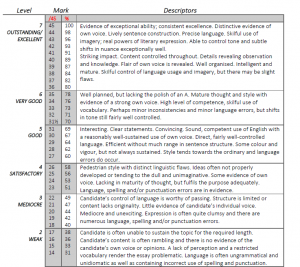
This I Believe by Tanya Matthews is licensed by CC-BY-SA
“This I Believe” Essay Copyright © 2020 by Liza Long; Amy Minervini; and Joel Gladd is licensed under a Creative Commons Attribution-ShareAlike 4.0 International License , except where otherwise noted.
Share This Book

This I Believe Essay

In the realm of personal expression and introspection, the “This I Believe” essay stands as a testament to the power of individual beliefs and narratives. Rooted in the context of personal experiences and convictions, these essays provide a platform for individuals to articulate their core principles, values, and perspectives. Through the use of various literary devices and elements , authors craft narratives that illuminate their unique outlook on life. In this article, we will delve into the definition of a This I Believe essay, present a step-by-step guide on how to craft one, address common questions, and explore the essence of this expressive form.
1. High School This I Believe Essay Example
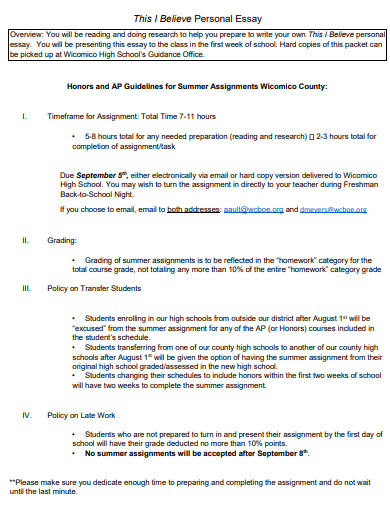
Size: 487 KB
2. Sample This I Believe Essay Example
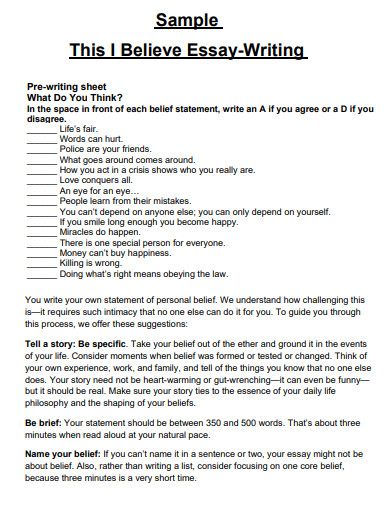
Size: 47 KB
3. Student This I Believe Essay Example
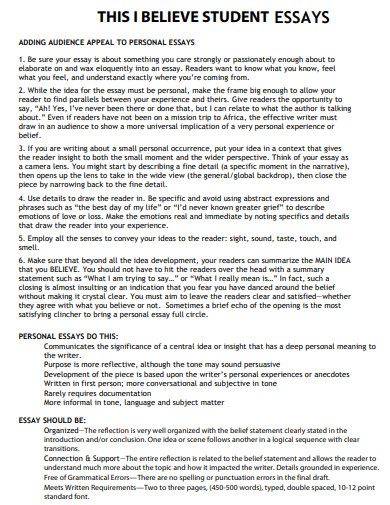
Size: 173 KB
4. Middle School This I Believe Essay Example
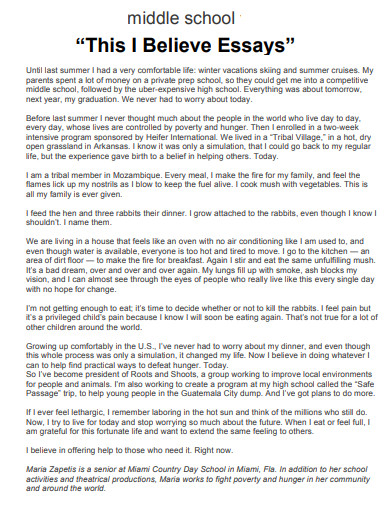
Size: 270 KB
5. This I Believe Essay Topic Example
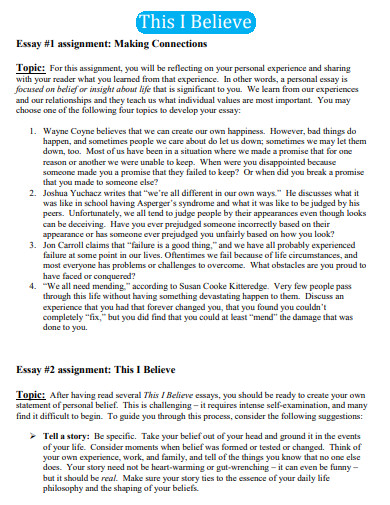
Size: 532 KB
6. This I Believe Essay Life Example
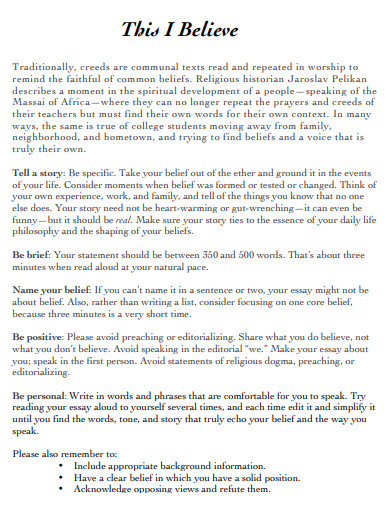
Size: 101 KB
7. This I Believe Essay Overview Example
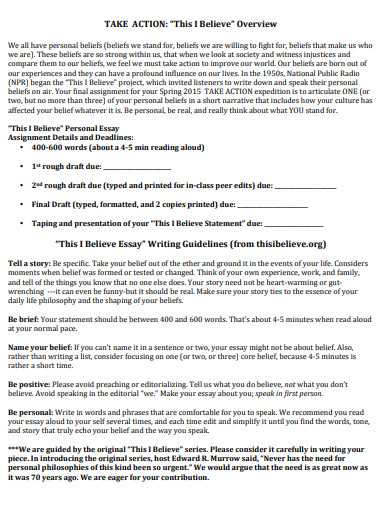
Size: 67 KB
8. This I Believe Essay Steps Example
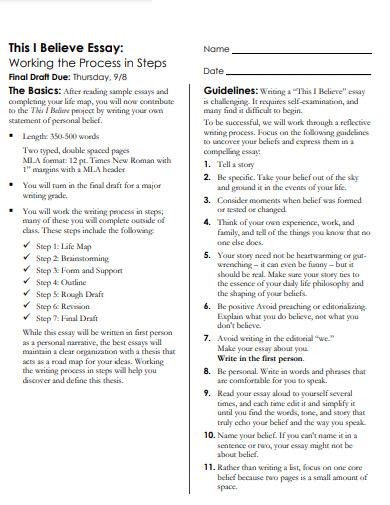
Size: 156 KB
9. This I Believe Essay Friendship Example
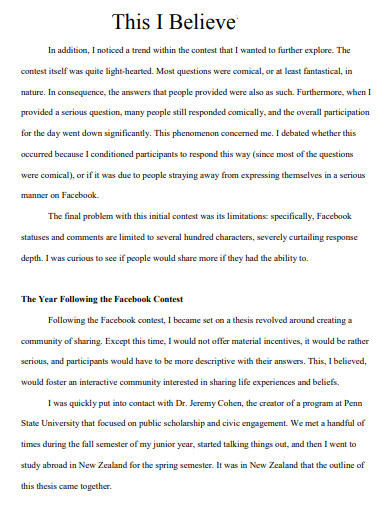
Size: 426 KB
10. Sports This I Believe Essay Example
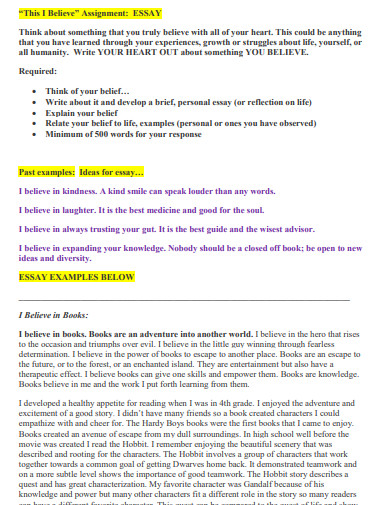
Size: 159 KB
11. This I Believe Essay Rubric Example
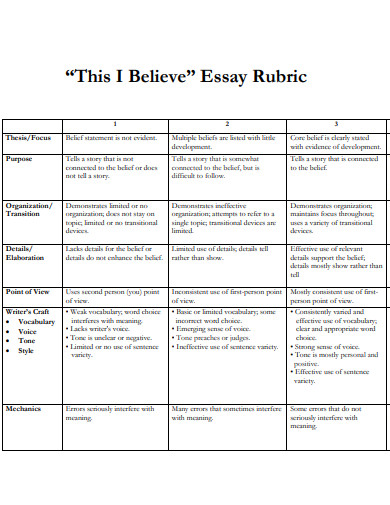
Size: 84 KB
12. This I Believe Personal Essay Example
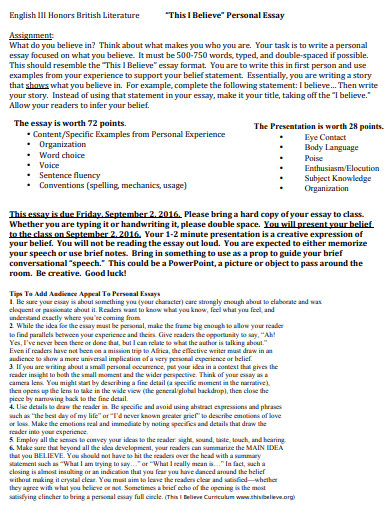
Size: 104 KB
13. This I Believe Essay Writing Example
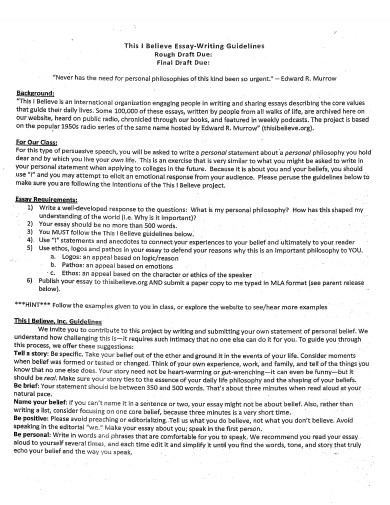
Size: 175 KB
14. This I Believe Essay Statement Example
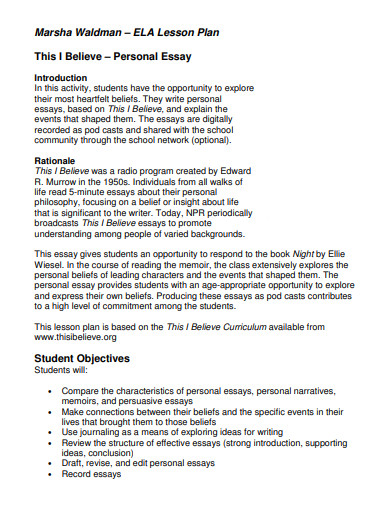
Size: 55 KB
15. God This I Believe Essay Example
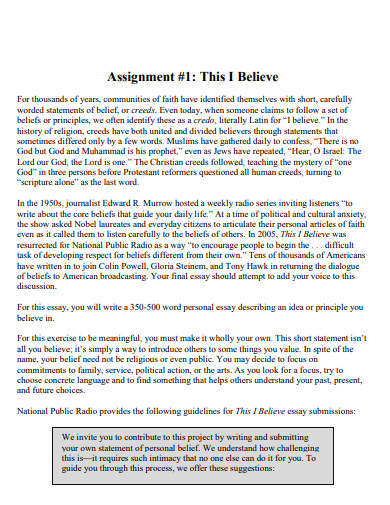
Size: 117 KB
16. This I Believe Essay Brief Example
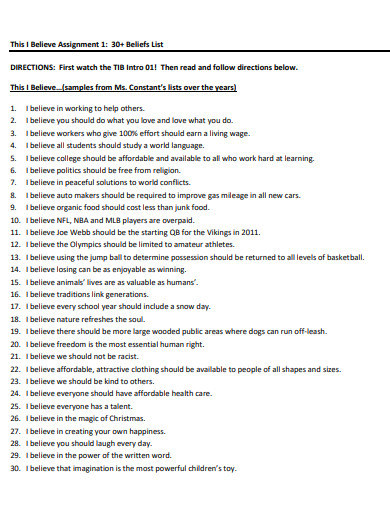
Size: 121 KB
17. This I Believe Essay Thesis Statement Example
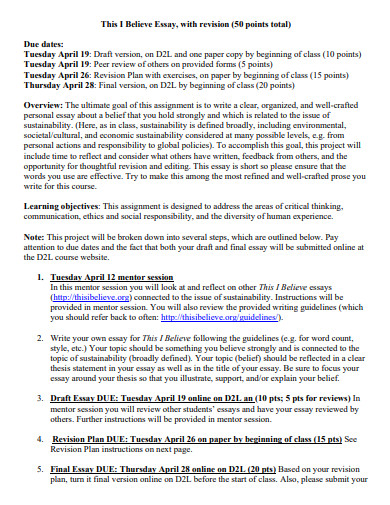
Size: 11 KB
18. This I Believe Essay Speech Example
19. this i believe essay college example.
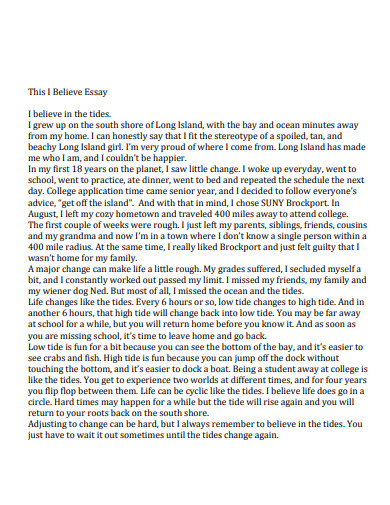
Size: 66 KB
20. This I Believe Essay Lesson Plan Example
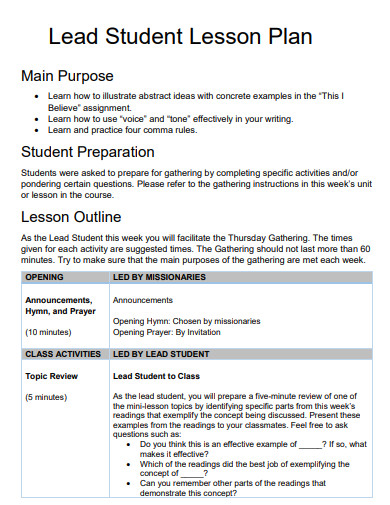
Size: 63 KB
21. This I Believe Essay Music Example
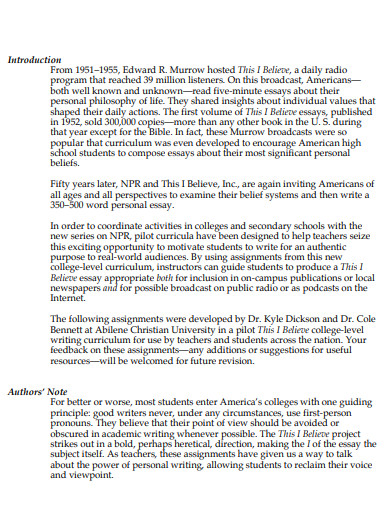
Size: 406 KB
22. Faith This I Believe Essay Example
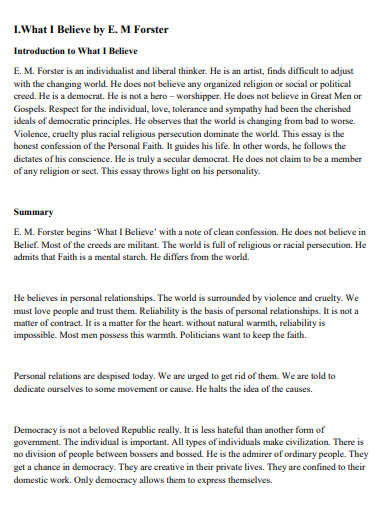
Size: 198 KB
23. Reflection This I Believe Essay Example
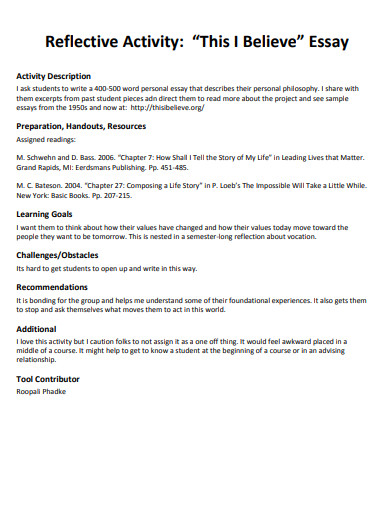
Size: 37 KB
24. This I Believe Immigration Essay Example
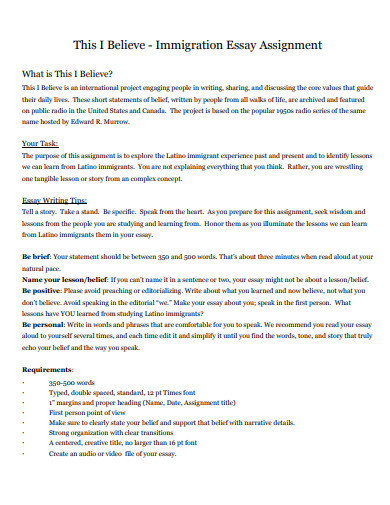
Size: 50 KB
25. This I Believe Love Essay Example
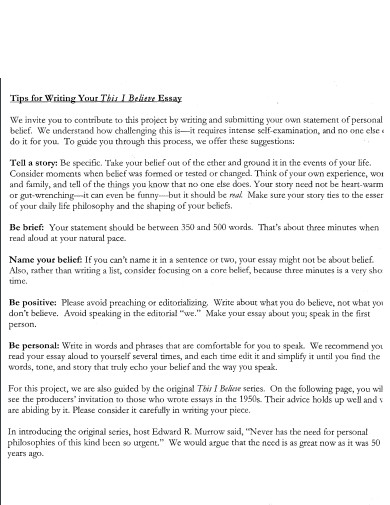
Size: 709 KB
26. This I Believe Dream Essay Example
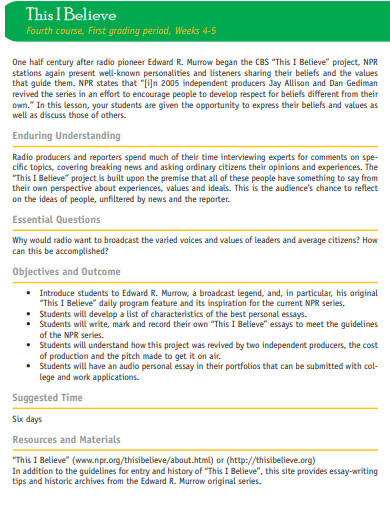
Size: 154 KB

27. This I Believe Power Essay Example
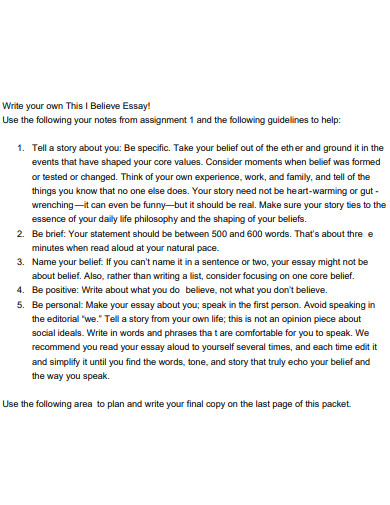
Size: 89 KB
28. This I Believe Essay Prompt Example
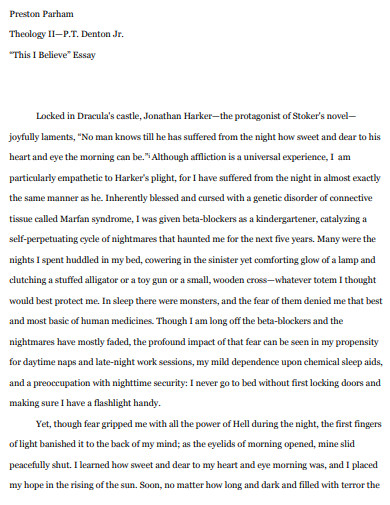
Size: 51 KB
29. This I Believe Essay Peer Review Example
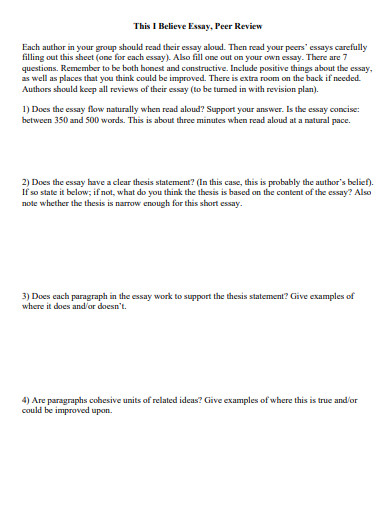
30. Elements of This I Believe Essay Example
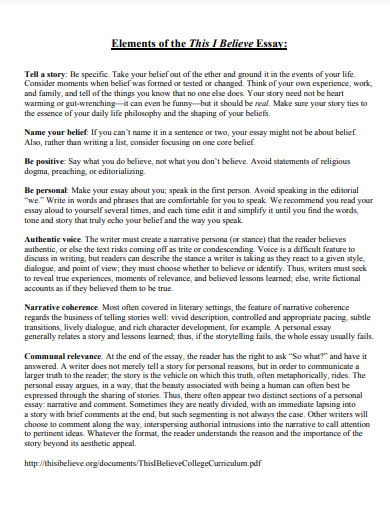
31. This I Believe Essay Transcript Example
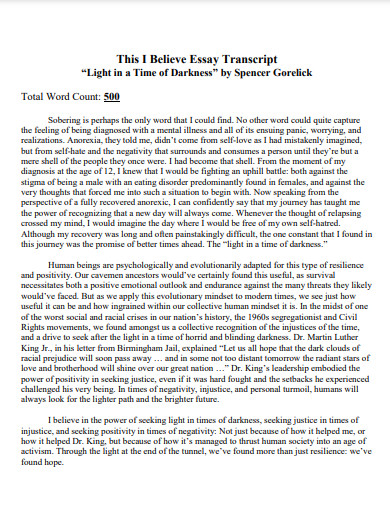
Size: 259 KB
What is a This I Believe Essay?
A This I Believe essay is a written composition that encapsulates an individual’s personal beliefs, values, and philosophies. Often reflective and intimate in nature, these essays offer readers insight into the author’s subjective understanding of the world. They provide an opportunity to explore the depth of one’s convictions, making use of various literary devices and characteristics to convey a sense of authenticity and sincerity. Through the exploration of individual experiences and convictions, these essays aim to connect with readers on a personal and emotional level.
How to Write a This I Believe Essay
Step 1: choose your core belief.
At the heart of your essay lies your core belief. Choose a belief that holds personal significance and represents your worldview. This belief should be something you feel passionately about and can articulate convincingly.
Step 2: Develop a Compelling Context
Create a context for your belief by providing background information. Explain why this belief is important to you and how it has shaped your experiences and outlook on life. A relatable context will engage your readers and make your essay more relatable.
Step 3: Employ Effective Literary Devices
Incorporate literary devices to enhance the impact of your essay. Metaphors, similes, and anecdotes can help convey your belief in a vivid and relatable manner. Consider how these devices can strengthen your narrative and connect with your audience emotionally.
Step 4: Craft a Strong Conclusion
Summarize your belief and its significance in your life, reinforcing the message you want to leave with your readers. Reflect on the journey you’ve taken them on and inspire them to reflect on their own beliefs.
Can I write about a commonly held belief?
Absolutely. While it’s important to maintain authenticity, even exploring a cliché belief can be powerful when you provide a fresh perspective or personal context. Your unique experiences and reflections make your essay stand out.
Can I use proper nouns in my essay?
Yes, proper nouns can add specificity and authenticity to your essay. Mentioning specific places, people, or events can help ground your beliefs in real-world experiences.
How can I make my essay more impactful?
Focus on using strong verbs to convey emotions and actions. Instead of saying “I felt sad,” consider saying “I crumbled under the weight of sorrow.” This adds depth to your writing and engages the reader’s senses.
In the realm of personal expression, the This I Believe essay shines as a vehicle for exploring one’s deepest convictions. By carefully selecting beliefs, weaving context, employing literary devices, and crafting strong conclusions, authors can create narratives that resonate with readers on a profound level. Through the power of words, these essays bridge the gap between individual experiences and universal truths, reminding us of the strength and diversity of human beliefs. So, take the plunge into introspection and share your beliefs with the world through the art of the This I Believe essay.
This I Believe Essay Generator
Text prompt
- Instructive
- Professional
Write a This I Believe Essay about the power of kindness in everyday life
Discuss in a This I Believe Essay how overcoming challenges has shaped your character
Put a stop to deadline pressure, and have your homework done by an expert.
How To Write A Winning This I Believe Essay

One of the common types of academic writing you are likely to encounter is this I believe essay. In this type of essay, you are required to write about something you believe in. Note that unlike many students think, the topic does not have to be related to religion. For example, you can write about something you love or interested in.
Although writing this I believe essay might sound simple; many students find it one of the complex types of academic writing. To help make the process simpler, we created this guide to help you understand how to write the best this I believe essay. We have also highlighted the 22 hot essay ideas that you can use.
How To Write This I Believe Essays
Here’s a brief guideline on how to write a good belief essay:
- Get a good essay topic When you are faced with the task of writing a this I believe essay, the first step is selecting a good topic. At this point, you should look for something that you have learned about through various experiences, life struggles, or humanity. Because it is a piece of academic writing, it is advisable to go for a topic that has some resources that you can use to back personal arguments. This will make the essay weighty and earn you more marks.
In the body of the essay, you should dig into more details about your beliefs. Make sure to discuss each point in a separate paragraph and provide examples to support it. If the narrative is long, break it down into several sections and use subtopics.
- Write and proofread your essay After developing the essay structure, it is time to start writing it. Pool together the main points and write a draft. Then work on the final copy and proofread it carefully to remove all mistakes. You could even ask an unbiased friend to help proofread the essay.
Special Tips for Writing this I Believe Essay
Once your teacher asks you to write an assignment on this I believe essay; the secret is ensuring to understand a concept that you are passionate about. To make it simpler for you, try to be truthful. Here are some more tips to help you craft a winning this I believe essay:
Follow the guidelines provided by your teacher or department. Make sure to focus on the item of interest and support it with personal examples. If possible, support the essay with secondary resources. Make sure to stay positive about the topic of interest. Because you are working on something personal, make sure to write in the first person. Try to be as concise as possible. The focus should be selecting points that explain your belief and restricting the essay within the recommended number of words. Read other this I believe essay examples to understand how to craft a winning paper. Most samples can help you to understand how to structure the essay and discuss different topics.
Top This I Believe Essay Topics
The most critical thing about writing a this I believe essay is selecting a topic idea because it determines what to focus on and points to discuss. To help you get started, we are going to list 22 hot this I believe essay ideas for you. Go ahead and pick the one you prefer or tweak them to suit your preference.
- I believe in having a lot of fun in and out of school.
- I believe in using a mentor to build a career.
- I believe in using advanced technology for learning.
- I believe I am unique.
- I believe in dreaming big and going out of my way to succeed.
- I believe in hard work to succeed in life.
- I believe in my facility.
- I believe in our justice system to build a harmonious society.
- I believe in repentance and hope.
- I believe that time is the best way to cure pain.
- I believe in the support of my family.
- I believe in our culture.
- I believe in love.
- I believe in the power of God to heal the sick.
- I believe in life after death.
- I believe in doctors’ ability to help pregnant mothers safely deliver their babies.
- I believe I can make my county better.
- I believe in my basketball team.
- I believe in always trusting my guts.
- I believe in the nature top address the problem of global warming.
- I believe in dedication to my duties at work.
- I believe that everyone’s life is predetermined.
This I Believe Essay Topics
Are you looking for the best this I believe essay topics? You can start with these. They are all dynamic and don’t point to just one subject. They are based on different realities of life.
- Everyone has a positive outlook on life
- Success requires self-determination
- Life and creativity and interlinked.
- A good life provides a positive outlook on my life
- There are stipulated fundamental factors to success.
- There are many modes of achieving success.
- Sure shortcut to reading fast
- There isn’t any accurate journey to success.
- Determination leads to better time management
- Collaboration is the start of a beautiful career journey.
- Immigrants also have beautiful lives.
- Making the most of the available time in a day leads to more goal achievement.
- A good life is the result of hard work and determination.
- Many factors lead to stigmatization
- The right implementation can help improve the health care setting.
- Proper conservation can lead to a cleaner ecosystem and environment.
- Well-built bonds can lead to an increase in better human relations.
- The industrial revolution will make an impact on the world.
This I Believe Essay Topic Ideas
What do you conform to? Do you think your beliefs are similar to your neighbors? Then you can consider challenging yourself using this I believe essay topic.
- I believe that the world can be a better place when justice is implemented
- I believe that love can help to sustain many family bonds
- I believe positivity is a major factor that leads to success.
- I believe that people should have a positive outlook on life.
- I believe that leaders are both born and made.
- I believe that friendship is important when it comes to socialization
- I believe that strong family bonds lead to the prosperity of different people in certain capacities.
- I believe that the solar system needs to be done more research.
- I believe that all dreams are valid
- I believe that many ideas can be implemented.
- I believe in kindness, honesty, and faith.
- I believe that every person has a role to play to make an impact in the world.
- I believe that college plays a big role in making students think out of the box.
- I believe that robots will play a huge role in the future.
- I believe that artificial intelligence will boost the business world.
- I believe that everyone has a right to a good life.
- I believe that life is much simpler when people help each other.
- I believe that all ideas are valid, regardless of how crazy they seem.
This I Believe Essay Topic List
We all have different beliefs that make us who we are. However, you don’t need to be too rigid, you need to be flexible enough to accept any new perceptions. The world is ever-changing.
- People can get visions that later become reality.
- Animals have a brain of their own.
- Every person on earth has a mission.
- Sports are essential for boosting flexibility.
- Technical ideas can help make the world easier to live in.
- People have different callings in their professions.
- Everyone has a good heart.
- The world can be a better place without any violence.
- Dead people can listen to us.
- Ancestors still exist within us.
- All the different professions have a purpose.
- Augmented reality will change the world.
- Industry 4.0 will help to revolutionize the world.
- Everyone was assigned a purpose at birth.
- A good mindset leads to more happiness.
- Patience and perseverance are important in life situations.
- Faith, love, and hope are important.
- Everyone has virtues they follow.
Best Belief Essay Ideas
People have different beliefs that make them who they are. However, you need to make a point of having a firm stand on what seems like the reality of life.
- I believe everything happens for a reason.
- I believe that miracles do happen.
- I believe that healing happens to those who have faith.
- I believe in the power of prayer
- I believe in the existence of aliens
- I believe that anger can at times be a good thing.
- I believe that people need to accept themselves as they are
- I believe that people connect better by giving
- I believe that ordinary people can change the world.
- I believe it is more important to focus on the bigger picture.
- I believe that the environment one lives in plays a role in how one grows up
- I believe in workplace ethics.
- I believe that families are the greatest support system
- I believe that family support escalates how fast one heals when sick.
- I believe that people start socializing better when young
- I believe that information technology is a game-changer
- I believe that equality of people can make the world a better place.
- I believe that everyone needs to have goals in life.
Interesting This I Believe Research Essays
When doing an essay, you need to do proper research to ensure that you capture all that is needed. Here are some interesting “this I believe” essay topics from our essay writers for hire that you can start with.
- You should worry about being judged by others.
- Without education, you can’t succeed in life.
- Creativity is both inborn and made.
- Anger can spoil many things.
- Change comes from within.
- Being kind to others is important.
- Knowledge can help you succeed in life.
- Reading helps to increase your creativity.
- Having two jobs can help you prosper in life.
- Everyone has a right to true happiness.
- Good parenting is good for moral adults.
- Ordinary people can change the world.
- Humanity is vital for everyone.
- We all have different realities.
- Nations can simply be led by laws without men.
- Without rules, the world can be dangerous.
- Injustices can be reduced.
- Small acts of kindness go a long way.
What’s Next?
Now that we have provided you with great essay topics demonstrated how to start a this I believe essay and close it, it is time to get down to writing your paper. However, if you still find it hard to write your college essay or the deadline is tight, consider seeking writing help or buy homework .
Writing assistance is provided by experts who understand what is the best this I believe essay format and can craft it even within short deadlines. Also, they are cheap and provide their services with a guarantee for high marks. Therefore, why settle for average marks when you have an opportunity to get A-quality papers?
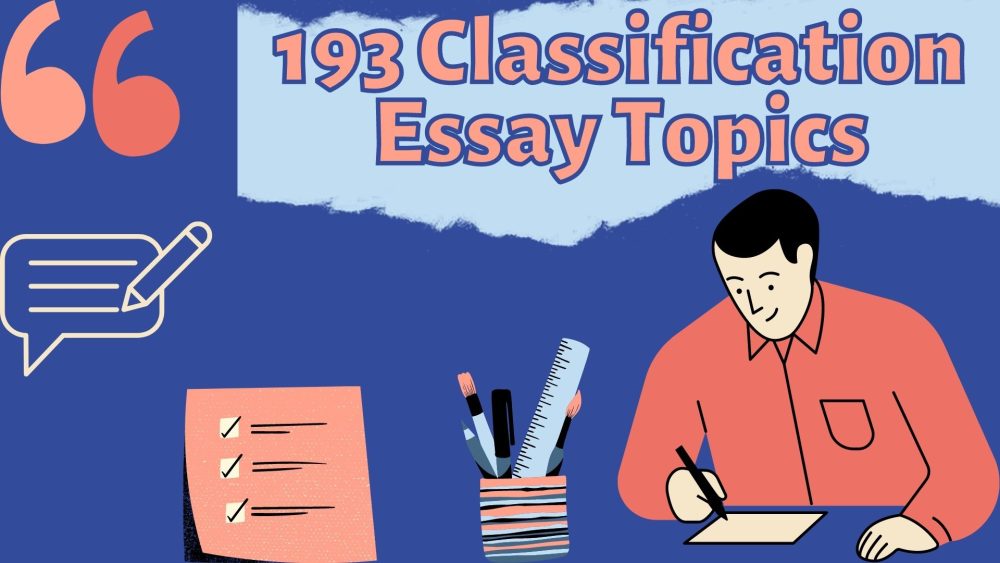
Get on top of your homework.
Leave a Reply Cancel reply
Your email address will not be published. Required fields are marked *
Power Lesson: “This I Believe” Essays
December 4, 2016
Can't find what you are looking for? Contact Us
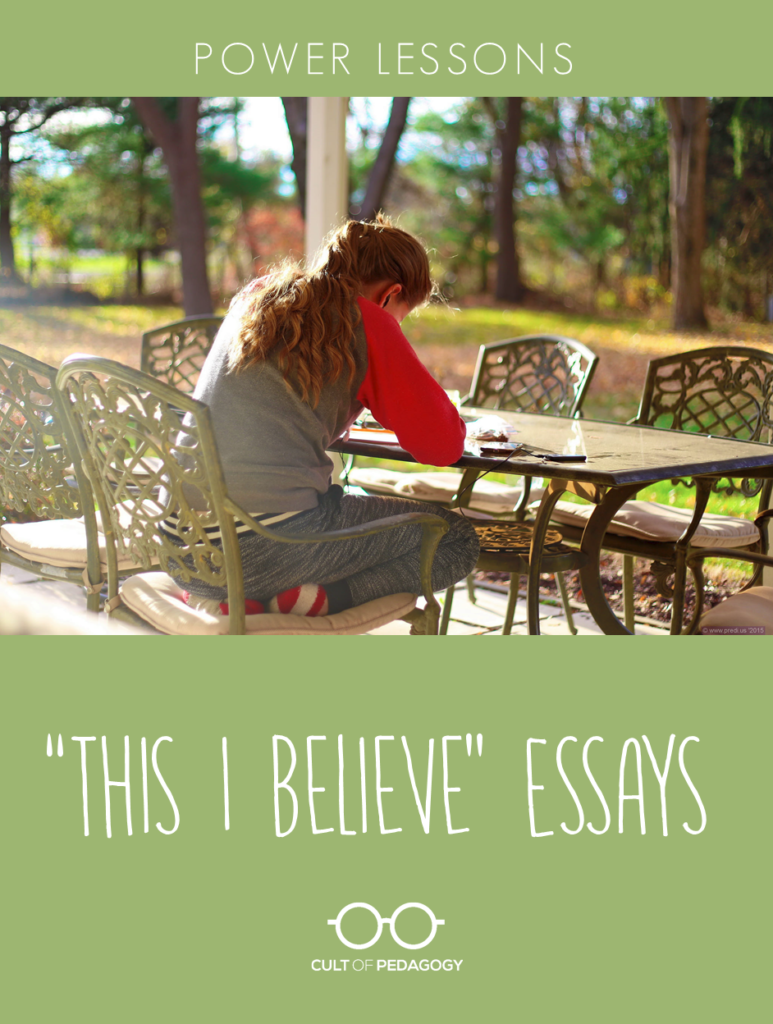
“Doing homework” by Predi is licensed under CC BY-ND 2.0
In this power lesson shared by high school English teacher Cynthia Ruiz , students write their own personal statements of belief. The essay pushes students to write about something that matters to them and helps them get to know each other on a deeper level.
I used to assign a “Letter to the Teacher” at the beginning of every year to get a snapshot of how a student writes while simultaneously learning background information. Being completely honest, this assignment is also an easy way to get the first few back-to-school days started when a 90-minute class period feels like 900 minutes, because everyone is typically on their best behavior and not talking much. Although I enjoy reading the letters, the assignment doesn’t lend itself to revising and is written only for a specific, one-person audience.
I know building relationships with students is important and a way to get to know them is through their writing, so I did some research to see what other teachers were trying. I came across the “This I Believe” site and immediately liked the concept better than an introduction letter for a teacher.
Assignment Guidelines
The first time I assigned a “This I Believe” essay was in the fall of 2014, during the second week of school. I planned it as a year-long endeavor, something we could work on as a distraction from other essays required to prepare for state testing. This past year, I did not assign it until late April; it would be our last major writing task. I wanted to give everyone plenty of time to write but held them to a firm deadline of having four weeks to work.
This time, I crafted my writing guidelines according to those posted on the NPR site that hosts hundreds of This I Believe essays from around the world. My rubric still has some typical writing conventions, but overall I think it focuses more on student voice than structure. I made it clear that students had a lot of choice regarding both content and format. The biggest restriction came directly from the This I Believe site: a 500-600 word limit. I know a lot of writing teachers are divided when it comes to word count, but I figured it was still better than giving a specific number of required paragraphs and sentences.
One other requirement was that students use at least three “vocabulary devices.” This may seem like a restriction, but it actually supported student voice. Over the spring semester, we spent a lot of time reviewing both rhetorical and literary devices (anaphora, hypothetical questions, simile) and I told students to focus on the devices they genuinely felt comfortable using.
Helping Students Choose a Topic
Because the rubric leaves room for a lot of choice, I encouraged students to visit the featured essays site and not only read, but listen to real examples. I wanted them to see that this wasn’t just another run-of-the-mill assignment, that what they believe is important and writing is just one way to share those beliefs. I also made it a point to tell them our end goal was to share this essay with their entire class by way of a gallery walk.
After giving students time to explore the site, I had them “rush write” in their notebooks to see what immediate ideas they captured to help start the brainstorming process. Here’s the prompt I used:
This I Believe For 2 minutes: List words or ideas that you think about when you think of YOUR LIFE. (Can be feelings, symbols, names, events, etc.)
After students generated this list, I asked them to consider what they wanted to write about and share with others. I wanted them to imagine a larger audience and think outside of meeting my expectations.
For some, deciding what to write about was easy and they began drafting immediately. However, the majority of students struggled not so much with what they believe, but how to write about it. Even though they appreciated having so much choice, they still needed some direction to get started.
We continued the listing strategy by focusing on “most memorables”: most memorable events in life so far, most memorable stuffed animal, most memorable friends, family experiences, life lessons learned, and so on. I asked them to focus on why they remember what they remember, and whether or not it impacts any of their beliefs. One student remembered a saying his grandmother always told him that still provides comfort as he’s gotten older. Another focused on her family not having a big house when they first moved to America and how she’s learned to be satisfied with opportunities instead of possessions. While this strategy helped a lot of light bulbs go off, it didn’t work for everyone.
Another strategy I tried was using involved sentence stems: I know I am the way I am today because______. I know I think about things the way I do because _______. I think most people would describe me as ______. I emphasized that these phrases did not have to be included in their final products, but should help generate ideas. I talked with a few frustrated students about this strategy and they told me it made them realize they’ve never really had to think about themselves in this way, but ultimately, it gave them direction for their essays.
Drafting and Revising
Because of block scheduling, I gave students about a week and a half to complete a working draft, which required having at least two paragraphs of their essay done. I only gave a portion of two to three class periods to actually write in class; students were expected to write on their own time.
On the day drafts were due, I set aside class time for revision. I asked students to refer to the rubric and focus on voice and vocabulary strategies. Questions I told them to consider were: Does this sound like me? Do I talk like this to my friends or family? I gave students the option of reviewing their own essays or partnering up with someone to peer edit. Again, this was the end of the year, so we had already established a pretty firm community of trust in class. I don’t know if peer editing would have been as easy had I done the assignment early in the year.
Overall, draft day didn’t feel like the usual “revising and editing” days we’ve had with other essays. Students were very concerned with whether or not they were making sense, if they should add more, or if they were being too repetitive, rather than only being concerned about capitalization, spelling, and grammatical errors.
Sharing the Finished Essays
The culmination of this assignment was when the essays were shared in a gallery walk . The gallery walk is my answer to having students write for a larger audience, and it really helps this essay become about what students have to say instead of just another grade. I can’t count how many times I have returned tediously graded essays only to have a kid immediately walk over to the recycling bin and trash it! Sure he read the comments and suggestions I made, or saw the cute smiley face I left by an excellent word choice, but it didn’t mean much to him because the paper is graded and finished, and he is now done thinking about it. With a gallery walk, not only are students thinking about what they wrote, but they have the opportunity to think about what their classmates wrote as well.
I printed each essay without any names, and made sure any identifying statements were revised. However, there were quite a few students who said they were proud of what they wrote and had no problem if others knew which essay belonged to them. Because not every student turned in a final copy, I printed additional copies of some completed essays to ensure every student had something to read during our gallery walk, instead of drawing attention to the two or three students who did not finish the assignment.
I placed the essays on different tables throughout the room and allowed students to move around as needed; some chose to stand and read an essay, others opted to sit, while others sprawled out on the floor to read. I played soft music and asked that the room volume stay quiet enough to be able to hear the music at all times. I didn’t mind if students were sharing and discussing, and I really wish I recorded the various conversations and comments I overheard that day: “Wow! Did you read this one yet?” “Man. Who wrote this? I might cry. Good tears, though.” “This one is life, Ms. Ruiz.”
I provided a pad of post-its near each essay and told students to leave POSITIVE feedback for each other. I provided sentence stems to help:
Something I liked…
Something I can relate to/agree with…
Something that surprised me…
Something I want to know more about…
I really think…
I periodically checked to make sure no one was being inappropriately critical or just leaving cute hearts or check marks. I wanted students to think about what they were reading, and understand that feedback is a crucial part of the writing process
After about 40 minutes, each essay had received multiple written comments, looking similar to the picture below:
Overall, the feedback was uplifting and actually created a sense of belonging in each class. Students told me they learned so much about each other that day and were shocked by their classmates’ writing. A few said they wished they had written this essay sooner.
Sample Student Work
I was floored by some of the essays I received. Some made me laugh, some made me gasp, some made me cry. Compared to the typical papers I usually assign, this essay allowed my students to not just think about what they were writing but to care about their writing and to be intentional in the language they were using, both in word choice and rhetorical strategies, because it was about what they believe. It is some of the strongest student writing I have ever received as an English teacher.
Here are some sample paragraphs from students who gave me permission to share their work:
From a student who told me he hates school and hates writing.
From a student who by all outward appearances, comes from a traditional family.
From a student battling depression and anxiety.
From a student who missed almost a whole semester but is trying to stay in school.
Although this essay helped end the year with a strong sense of community, I think teachers could easily have students write it at the beginning of the school year or even in January at the start of a new year. I’d love to hear how other teachers have used an essay like this in their classes. ♦
Have you taught a lesson or designed a learning experience we should feature in Power Lessons? Send a full description of your lesson through our contact form and we’ll check it out!
What to Read Next

Categories: Instruction
Tags: English language arts , lesson planning , power lessons
39 Comments
Cynthia and Jennifer, Thank you for sharing this Power Lesson; it’s one I plan on “borrowing” for sure in January. I love the connection built during the gallery walk. I can imagine this being truly powerful for all students. Well done!
I LOVE this!! I will use this in the Spring with my students. The excerpts in the blog post were so personal. I hope the students realize what a gift they shared.
Tonya, I agree. I’m always so grateful when students are willing to let us see their work here!
I love this assignment. I use it every semester with Public Speaking students, following a similar brainstorm and drafting process. Since the assignment comes from a radio program, my students audio record themselves, and our celebration of the work happens through hearing each student read the essay. Very powerful hearing their voices!
Ruth, thanks so much for taking the time to share this idea. I’m sure lots of teachers will love how audio enriches this assignment.
Thank you for sharing the students’ samples. Writing is such a great way to express oneself and when you make it personal students are engaged. ❤️ it! I am thinking about adding it as my last assignment for my 3rd graders!
Thank you for sharing, especially the students’ work samples.This will help inspire my students to share important details about their lives. Might I also recommend an excellent book I purchased used recently: Reading, Writing and Rising Up (by Linda Christensen)
I like this writing strategy. Last week I started something similar with my Arabic students. In groups of 3 to 4 students, they wrote stories (Brainstorm, first draft…) They started writing their final draft(with illustrations and drawings) on the butcher paper. On Monday, they will hang it on the wall and they will give each other feed back wile walking and reading each other’s essays. The problem with the foreign languages students writing is that they have brilliant ideas in English, but they cannot express them in Arabic or French… My questions is the following: Is there a way to adapt this writing strategy to World Languages students with taking into consideration the limited students’ language levels.
I love this assignment. I use at the end of the year with my seniors. I tell them to focus on a belief that they have formed over their past years of school and that will guide them as they make steps on their next journey — college, military, work, etc. Every year I am awed by the thought and pride they take in it. Their voices shine through the papers. The emotions, ranging from joy to sadness or humor to regret, overtake their essay making each both personal and universal. I also always write one that I individualize for each class and how they have shaped or firmed one of my own beliefs.
I love this, especially as a way to “re-enter” in January! I hope that I can use it effectively with my middle schoolers. Thank you so much for sharing this!
YES!! This was my first lesson in my first year of teaching and it completely set the tone for the rest of the year. The work I received from eleven year olds blew my mind, and I even submitted(with their permission) a few pieces to be published because they were that deep. Bravo to this I believe essays & sharing lessons like this with other educators.
Did you find that you had to add in any scaffolds/support for students? I want to try this with my 7th graders who really struggle with writing and getting started with ideas.
This looks like a fabulous project and one I am keen to try out next semester.
I, too, have been doing this assignment for a few years now. It is my favorite assignment of the year. I teach 8th grade English and I have my students share their essays aloud. We sit in a circle and listen to each student share his/her belief. It is powerful. We laugh. We cry. We learn. Having students write for an audience of their peers is challenging for them, but so rewarding in the end.
This looks great for January. I noticed that the This I Believe website has a high school curriculum for sale for $20. Has anyone used it? Is it worth it? Necessary?
This reminds me of an assignment I had in high school. It was called our “Capstone,” and was a year-long process (12th grade). We first chose three things that were important to our lives: a person, a place, and an event. Over the first semester we wrote about these in three separate papers. Then come second semester we had to connect them with a metaphor, and put together a 20 minute presentation that connected everything. It really allowed students to get creative while expressing what was most important to us.
Do you happen to have an example of this still? It sounds AWESOME and I would love to do it with my 8th graders!
Your students’ essays are beautiful, authentic and inspiring, as I am sure your teaching is. Thank you for sharing.
Thanks for the lesson. I like this idea for journaling too!
A brilliant idea! Thanks!
Thanks for sharing and including student work examples. Essays like this are a great way to get to know students at a deeper level and could also make a good college entrance essay!
Thank you for sharing this. Inspirational and heartfelt writing from young people.
This is so inspiring and beautiful. Thank you so much, both of you for sharing this power lesson. I was lookibng for a writing task muy ss could include in their e-Portafolio. Can’t wait to try it!! Thank you again!!
I know this might be simplistic, but could you share more about the vocabulary devices?
Hi, April! For the vocabulary devices, I’m referring to adding similes, metaphors, hyperboles, imagery, etc. We usually practice devices like anaphora and asyndeton in my advanced classes, so those can also be used. One of my favorite lines this year was: “I mean, I thought a step stool would do the job but instead it was like climbing a 20 foot ladder just to finish my goal…” We talked about how using a vocab device is more powerful than “I worked really hard.” Hope that helps! Cheers!
This is sooooo great!! I love it!!!!!
I love this. Has anyone tried it at the start if the year? Are students willing to write about such personal experiences and beliefs with a teacher and classmates that they don’t know well?
Hi Lizzie! I work for Cult of Pedagogy, but I’m replying as a teacher. I teach college level freshman comp and I started my previous semester with this essay. Because it was the beginning of the year, I didn’t do a gallery walk; it was more of a practice assignment to get used to the flow of papers and feedback. They had to bring in a rough draft for in-class workshops, so I made sure they knew a few of their classmates would be reading what they wrote. For extra credit, I offered them the chance to record their paper as a “podcast” and post it on YouTube. I was blown away by how in-depth most of them went! In fact, I’m starting my fall semester with it again.
I love this assignment in the spring for senior English. Generally, kids are appreciative that we’re doing the final writing assignment about something that is ‘real world legit’. I’ve always been impressed by their level of attention (and attendance),as our gallery walk happens on the last day of their English class in June.
Hi! This looks like a fantastic lesson and I would love to try it with one of my English classes. I noticed that your writing guidelines link is no longer available. Is there anyway I could get this information? Thanks Kelsey
Hi Kelsey! Thanks for letting us know about the link. This was a guest post and we will be happy to reach out to Cynthia to see if she has a current link to the writing guidelines. If so, we’ll get that updated on the post as soon as we can. Thanks again!
I was wondering about the guidelines as well. I teach in China and we are out of school right now for Chinese New Year, so I would love to have this when we return in February. Thanks for your help!
Hi Karen & Kelsey! I wanted to follow up on your request for the guidelines to let you know that Jenn no longer has access to them. If you haven’t already done so, Jenn recommends to check out the writing guidelines posted on NPR. I hope this helps!
I teach a course called Theory of Knowledge. One of the concepts we study is ‘faith’ as a way of knowing or gaining knowledge. I remember the “This I believe” series on the radio and then NPR. I have my students read several of the essays from the website and a few I copy from one of the books published. Then, they brainstorm and write their own essays. This spring, right before the Covid shutdown, one of my students committed suicide. I had returned his essay to him only days before; he’d written about the importance of love and relationships in life. Being able to share his essay with his mother and brother (who I had also taught) was a gift for all of us. I think the inspiration to have students write these essays was somehow a preparation for this sad experience. I like the suggestions here and may use the sentence stems to help those who struggle to get started.
Hello! I want to say that I had some difficulties in writing essays and statements. When I entered college, the first thing I encountered was writing a quality application.
thanks for sharing, this is really useful information for me!
thanks for sharing informative!
This looks like an amazing lesson plan and although it is late in the year I will try to use it. could you please send the grading rubric you used?
Hi, there! Because this post was written so long ago,we have unfortunately lost touch with the author, Cynthia Ruiz. From what we understand, she is no longer in the classroom. However, you may be able to connect with her on Twitter by clicking on the Twitter icon at the top of the post underneath Cynthia’s name.
If you are looking to create your own rubric, the section of this post called Assignment Guidelines links to the NPR website where Cynthia found the writing guidelines that she used as a basis for her own. In addition, there is another Cult of Pedagogy post on the single-point rubric , which you might find useful. I hope this helps!
Leave a Reply
Your email address will not be published.

Choose Your Test
Sat / act prep online guides and tips, 53 stellar college essay topics to inspire you.
College Essays

Most colleges and universities in the United States require applicants to submit at least one essay as part of their application. But trying to figure out what college essay topics you should choose is a tricky process. There are so many potential things you could write about!
In this guide, we go over the essential qualities that make for a great college essay topic and give you 50+ college essay topics you can use for your own statement . In addition, we provide you with helpful tips for turning your college essay topic into a stellar college essay.
What Qualities Make for a Good College Essay Topic?
Regardless of what you write about in your personal statement for college , there are key features that will always make for a stand-out college essay topic.
#1: It’s Specific
First off, good college essay topics are extremely specific : you should know all the pertinent facts that have to do with the topic and be able to see how the entire essay comes together.
Specificity is essential because it’ll not only make your essay stand out from other statements, but it'll also recreate the experience for admissions officers through its realism, detail, and raw power. You want to tell a story after all, and specificity is the way to do so. Nobody wants to read a vague, bland, or boring story — not even admissions officers!
For example, an OK topic would be your experience volunteering at a cat shelter over the summer. But a better, more specific college essay topic would be how you deeply connected with an elderly cat there named Marty, and how your bond with him made you realize that you want to work with animals in the future.
Remember that specificity in your topic is what will make your essay unique and memorable . It truly is the key to making a strong statement (pun intended)!
#2: It Shows Who You Are
In addition to being specific, good college essay topics reveal to admissions officers who you are: your passions and interests, what is important to you, your best (or possibly even worst) qualities, what drives you, and so on.
The personal statement is critical because it gives schools more insight into who you are as a person and not just who you are as a student in terms of grades and classes.
By coming up with a real, honest topic, you’ll leave an unforgettable mark on admissions officers.
#3: It’s Meaningful to You
The very best college essay topics are those that hold deep meaning to their writers and have truly influenced them in some significant way.
For instance, maybe you plan to write about the first time you played Skyrim to explain how this video game revealed to you the potentially limitless worlds you could create, thereby furthering your interest in game design.
Even if the topic seems trivial, it’s OK to use it — just as long as you can effectively go into detail about why this experience or idea had such an impact on you .
Don’t give in to the temptation to choose a topic that sounds impressive but doesn’t actually hold any deep meaning for you. Admissions officers will see right through this!
Similarly, don’t try to exaggerate some event or experience from your life if it’s not all that important to you or didn’t have a substantial influence on your sense of self.
#4: It’s Unique
College essay topics that are unique are also typically the most memorable, and if there’s anything you want to be during the college application process, it’s that! Admissions officers have to sift through thousands of applications, and the essay is one of the only parts that allows them to really get a sense of who you are and what you value in life.
If your essay is trite or boring, it won’t leave much of an impression , and your application will likely get immediately tossed to the side with little chance of seeing admission.
But if your essay topic is very original and different, you’re more likely to earn that coveted second glance at your application.
What does being unique mean exactly, though? Many students assume that they must choose an extremely rare or crazy experience to talk about in their essays —but that's not necessarily what I mean by "unique." Good college essay topics can be unusual and different, yes, but they can also be unique takes on more mundane or common activities and experiences .
For instance, say you want to write an essay about the first time you went snowboarding. Instead of just describing the details of the experience and how you felt during it, you could juxtapose your emotions with a creative and humorous perspective from the snowboard itself. Or you could compare your first attempt at snowboarding with your most recent experience in a snowboarding competition. The possibilities are endless!
#5: It Clearly Answers the Question
Finally, good college essay topics will clearly and fully answer the question(s) in the prompt.
You might fail to directly answer a prompt by misinterpreting what it’s asking you to do, or by answering only part of it (e.g., answering just one out of three questions).
Therefore, make sure you take the time to come up with an essay topic that is in direct response to every question in the prompt .
Take this Coalition Application prompt as an example:
What is the hardest part of being a teenager now? What's the best part? What advice would you give a younger sibling or friend (assuming they would listen to you)?
For this prompt, you’d need to answer all three questions (though it’s totally fine to focus more on one or two of them) to write a compelling and appropriate essay.
This is why we recommend reading and rereading the essay prompt ; you should know exactly what it’s asking you to do, well before you start brainstorming possible college application essay topics.

53 College Essay Topics to Get Your Brain Moving
In this section, we give you a list of 53 examples of college essay topics. Use these as jumping-off points to help you get started on your college essay and to ensure that you’re on track to coming up with a relevant and effective topic.
All college application essay topics below are categorized by essay prompt type. We’ve identified six general types of college essay prompts:
Why This College?
Change and personal growth, passions, interests, and goals, overcoming a challenge, diversity and community, solving a problem.
Note that these prompt types could overlap with one another, so you’re not necessarily limited to just one college essay topic in a single personal statement.
- How a particular major or program will help you achieve your academic or professional goals
- A memorable and positive interaction you had with a professor or student at the school
- Something good that happened to you while visiting the campus or while on a campus tour
- A certain class you want to take or a certain professor you’re excited to work with
- Some piece of on-campus equipment or facility that you’re looking forward to using
- Your plans to start a club at the school, possibly to raise awareness of a major issue
- A study abroad or other unique program that you can’t wait to participate in
- How and where you plan to volunteer in the community around the school
- An incredible teacher you studied under and the positive impact they had on you
- How you went from really liking something, such as a particular movie star or TV show, to not liking it at all (or vice versa)
- How yours or someone else’s (change in) socioeconomic status made you more aware of poverty
- A time someone said something to you that made you realize you were wrong
- How your opinion on a controversial topic, such as gay marriage or DACA, has shifted over time
- A documentary that made you aware of a particular social, economic, or political issue going on in the country or world
- Advice you would give to your younger self about friendship, motivation, school, etc.
- The steps you took in order to kick a bad or self-sabotaging habit
- A juxtaposition of the first and most recent time you did something, such as dance onstage
- A book you read that you credit with sparking your love of literature and/or writing
- A school assignment or project that introduced you to your chosen major
- A glimpse of your everyday routine and how your biggest hobby or interest fits into it
- The career and (positive) impact you envision yourself having as a college graduate
- A teacher or mentor who encouraged you to pursue a specific interest you had
- How moving around a lot helped you develop a love of international exchange or learning languages
- A special skill or talent you’ve had since you were young and that relates to your chosen major in some way, such as designing buildings with LEGO bricks
- Where you see yourself in 10 or 20 years
- Your biggest accomplishment so far relating to your passion (e.g., winning a gold medal for your invention at a national science competition)
- A time you lost a game or competition that was really important to you
- How you dealt with the loss or death of someone close to you
- A time you did poorly in a class that you expected to do well in
- How moving to a new school impacted your self-esteem and social life
- A chronic illness you battled or are still battling
- Your healing process after having your heart broken for the first time
- A time you caved under peer pressure and the steps you took so that it won't happen again
- How you almost gave up on learning a foreign language but stuck with it
- Why you decided to become a vegetarian or vegan, and how you navigate living with a meat-eating family
- What you did to overcome a particular anxiety or phobia you had (e.g., stage fright)
- A history of a failed experiment you did over and over, and how you finally found a way to make it work successfully
- Someone within your community whom you aspire to emulate
- A family tradition you used to be embarrassed about but are now proud of
- Your experience with learning English upon moving to the United States
- A close friend in the LGBTQ+ community who supported you when you came out
- A time you were discriminated against, how you reacted, and what you would do differently if faced with the same situation again
- How you navigate your identity as a multiracial, multiethnic, and/or multilingual person
- A project or volunteer effort you led to help or improve your community
- A particular celebrity or role model who inspired you to come out as LGBTQ+
- Your biggest challenge (and how you plan to tackle it) as a female in a male-dominated field
- How you used to discriminate against your own community, and what made you change your mind and eventually take pride in who you are and/or where you come from
- A program you implemented at your school in response to a known problem, such as a lack of recycling cans in the cafeteria
- A time you stepped in to mediate an argument or fight between two people
- An app or other tool you developed to make people’s lives easier in some way
- A time you proposed a solution that worked to an ongoing problem at school, an internship, or a part-time job
- The steps you took to identify and fix an error in coding for a website or program
- An important social or political issue that you would fix if you had the means

How to Build a College Essay in 6 Easy Steps
Once you’ve decided on a college essay topic you want to use, it’s time to buckle down and start fleshing out your essay. These six steps will help you transform a simple college essay topic into a full-fledged personal statement.
Step 1: Write Down All the Details
Once you’ve chosen a general topic to write about, get out a piece of paper and get to work on creating a list of all the key details you could include in your essay . These could be things such as the following:
- Emotions you felt at the time
- Names, places, and/or numbers
- Dialogue, or what you or someone else said
- A specific anecdote, example, or experience
- Descriptions of how things looked, felt, or seemed
If you can only come up with a few details, then it’s probably best to revisit the list of college essay topics above and choose a different one that you can write more extensively on.
Good college essay topics are typically those that:
- You remember well (so nothing that happened when you were really young)
- You're excited to write about
- You're not embarrassed or uncomfortable to share with others
- You believe will make you positively stand out from other applicants
Step 2: Figure Out Your Focus and Approach
Once you have all your major details laid out, start to figure out how you could arrange them in a way that makes sense and will be most effective.
It’s important here to really narrow your focus: you don’t need to (and shouldn’t!) discuss every single aspect of your trip to visit family in Indonesia when you were 16. Rather, zero in on a particular anecdote or experience and explain why and how it impacted you.
Alternatively, you could write about multiple experiences while weaving them together with a clear, meaningful theme or concept , such as how your math teacher helped you overcome your struggle with geometry over the course of an entire school year. In this case, you could mention a few specific times she tutored you and most strongly supported you in your studies.
There’s no one right way to approach your college essay, so play around to see what approaches might work well for the topic you’ve chosen.
If you’re really unsure about how to approach your essay, think about what part of your topic was or is most meaningful and memorable to you, and go from there.
Step 3: Structure Your Narrative
- Beginning: Don’t just spout off a ton of background information here—you want to hook your reader, so try to start in the middle of the action , such as with a meaningful conversation you had or a strong emotion you felt. It could also be a single anecdote if you plan to center your essay around a specific theme or idea.
- Middle: Here’s where you start to flesh out what you’ve established in the opening. Provide more details about the experience (if a single anecdote) or delve into the various times your theme or idea became most important to you. Use imagery and sensory details to put the reader in your shoes.
- End: It’s time to bring it all together. Finish describing the anecdote or theme your essay centers around and explain how it relates to you now , what you’ve learned or gained from it, and how it has influenced your goals.

Step 4: Write a Rough Draft
By now you should have all your major details and an outline for your essay written down; these two things will make it easy for you to convert your notes into a rough draft.
At this stage of the writing process, don’t worry too much about vocabulary or grammar and just focus on getting out all your ideas so that they form the general shape of an essay . It’s OK if you’re a little over the essay's word limit — as you edit, you’ll most likely make some cuts to irrelevant and ineffective parts anyway.
If at any point you get stuck and have no idea what to write, revisit steps 1-3 to see whether there are any important details or ideas you might be omitting or not elaborating on enough to get your overall point across to admissions officers.
Step 5: Edit, Revise, and Proofread
- Sections that are too wordy and don’t say anything important
- Irrelevant details that don’t enhance your essay or the point you're trying to make
- Parts that seem to drag or that feel incredibly boring or redundant
- Areas that are vague and unclear and would benefit from more detail
- Phrases or sections that are awkwardly placed and should be moved around
- Areas that feel unconvincing, inauthentic, or exaggerated
Start paying closer attention to your word choice/vocabulary and grammar at this time, too. It’s perfectly normal to edit and revise your college essay several times before asking for feedback, so keep working with it until you feel it’s pretty close to its final iteration.
This step will likely take the longest amount of time — at least several weeks, if not months — so really put effort into fixing up your essay. Once you’re satisfied, do a final proofread to ensure that it’s technically correct.
Step 6: Get Feedback and Tweak as Needed
After you’ve overhauled your rough draft and made it into a near-final draft, give your essay to somebody you trust , such as a teacher or parent, and have them look it over for technical errors and offer you feedback on its content and overall structure.
Use this feedback to make any last-minute changes or edits. If necessary, repeat steps 5 and 6. You want to be extra sure that your essay is perfect before you submit it to colleges!
Recap: From College Essay Topics to Great College Essays
Many different kinds of college application essay topics can get you into a great college. But this doesn’t make it any easier to choose the best topic for you .
In general, the best college essay topics have the following qualities :
- They’re specific
- They show who you are
- They’re meaningful to you
- They’re unique
- They clearly answer the question
If you ever need help coming up with an idea of what to write for your essay, just refer to the list of 53 examples of college essay topics above to get your brain juices flowing.
Once you’ve got an essay topic picked out, follow these six steps for turning your topic into an unforgettable personal statement :
- Write down all the details
- Figure out your focus and approach
- Structure your narrative
- Write a rough draft
- Edit, revise, and proofread
- Get feedback and tweak as needed
And with that, I wish you the best of luck on your college essays!
What’s Next?
Writing a college essay is no simple task. Get expert college essay tips with our guides on how to come up with great college essay ideas and how to write a college essay, step by step .
You can also check out this huge list of college essay prompts to get a feel for what types of questions you'll be expected to answer on your applications.
Want to see examples of college essays that absolutely rocked? You're in luck because we've got a collection of 100+ real college essay examples right here on our blog!

Hannah received her MA in Japanese Studies from the University of Michigan and holds a bachelor's degree from the University of Southern California. From 2013 to 2015, she taught English in Japan via the JET Program. She is passionate about education, writing, and travel.
Ask a Question Below
Have any questions about this article or other topics? Ask below and we'll reply!
Improve With Our Famous Guides
- For All Students
The 5 Strategies You Must Be Using to Improve 160+ SAT Points
How to Get a Perfect 1600, by a Perfect Scorer
Series: How to Get 800 on Each SAT Section:
Score 800 on SAT Math
Score 800 on SAT Reading
Score 800 on SAT Writing
Series: How to Get to 600 on Each SAT Section:
Score 600 on SAT Math
Score 600 on SAT Reading
Score 600 on SAT Writing
Free Complete Official SAT Practice Tests
What SAT Target Score Should You Be Aiming For?
15 Strategies to Improve Your SAT Essay
The 5 Strategies You Must Be Using to Improve 4+ ACT Points
How to Get a Perfect 36 ACT, by a Perfect Scorer
Series: How to Get 36 on Each ACT Section:
36 on ACT English
36 on ACT Math
36 on ACT Reading
36 on ACT Science
Series: How to Get to 24 on Each ACT Section:
24 on ACT English
24 on ACT Math
24 on ACT Reading
24 on ACT Science
What ACT target score should you be aiming for?
ACT Vocabulary You Must Know
ACT Writing: 15 Tips to Raise Your Essay Score
How to Get Into Harvard and the Ivy League
How to Get a Perfect 4.0 GPA
How to Write an Amazing College Essay
What Exactly Are Colleges Looking For?
Is the ACT easier than the SAT? A Comprehensive Guide
Should you retake your SAT or ACT?
When should you take the SAT or ACT?
Stay Informed
Get the latest articles and test prep tips!
Looking for Graduate School Test Prep?
Check out our top-rated graduate blogs here:
GRE Online Prep Blog
GMAT Online Prep Blog
TOEFL Online Prep Blog
Holly R. "I am absolutely overjoyed and cannot thank you enough for helping me!”
What are your chances of acceptance?
Calculate for all schools, your chance of acceptance.
Your chancing factors
Extracurriculars.
112 Persuasive Speech Topics That Are Actually Engaging
What’s covered:, how to pick an awesome persuasive speech topic, 112 engaging persuasive speech topics, tips for preparing your persuasive speech.
Writing a stellar persuasive speech requires a carefully crafted argument that will resonate with your audience to sway them to your side. This feat can be challenging to accomplish, but an engaging, thought-provoking speech topic is an excellent place to start.
When it comes time to select a topic for your persuasive speech, you may feel overwhelmed by all the options to choose from—or your brain may be drawing a completely blank slate. If you’re having trouble thinking of the perfect topic, don’t worry. We’re here to help!
In this post, we’re sharing how to choose the perfect persuasive speech topic and tips to prepare for your speech. Plus, you’ll find 112 persuasive speech topics that you can take directly from us or use as creative inspiration for your own ideas!
Choose Something You’re Passionate About
It’s much easier to write, research, and deliver a speech about a cause you care about. Even if it’s challenging to find a topic that completely sparks your interest, try to choose a topic that aligns with your passions.
However, keep in mind that not everyone has the same interests as you. Try to choose a general topic to grab the attention of the majority of your audience, but one that’s specific enough to keep them engaged.
For example, suppose you’re giving a persuasive speech about book censorship. In that case, it’s probably too niche to talk about why “To Kill a Mockingbird” shouldn’t be censored (even if it’s your favorite book), and it’s too broad to talk about media censorship in general.
Steer Clear of Cliches
Have you already heard a persuasive speech topic presented dozens of times? If so, it’s probably not an excellent choice for your speech—even if it’s an issue you’re incredibly passionate about.
Although polarizing topics like abortion and climate control are important to discuss, they aren’t great persuasive speech topics. Most people have already formed an opinion on these topics, which will either cause them to tune out or have a negative impression of your speech.
Instead, choose topics that are fresh, unique, and new. If your audience has never heard your idea presented before, they will be more open to your argument and engaged in your speech.
Have a Clear Side of Opposition
For a persuasive speech to be engaging, there must be a clear side of opposition. To help determine the arguability of your topic, ask yourself: “If I presented my viewpoint on this topic to a group of peers, would someone disagree with me?” If the answer is yes, then you’ve chosen a great topic!
Now that we’ve laid the groundwork for what it takes to choose a great persuasive speech topic, here are over one hundred options for you to choose from.
- Should high school athletes get tested for steroids?
- Should schools be required to have physical education courses?
- Should sports grades in school depend on things like athletic ability?
- What sport should be added to or removed from the Olympics?
- Should college athletes be able to make money off of their merchandise?
- Should sports teams be able to recruit young athletes without a college degree?
- Should we consider video gamers as professional athletes?
- Is cheerleading considered a sport?
- Should parents allow their kids to play contact sports?
- Should professional female athletes be paid the same as professional male athletes?
- Should college be free at the undergraduate level?
- Is the traditional college experience obsolete?
- Should you choose a major based on your interests or your potential salary?
- Should high school students have to meet a required number of service hours before graduating?
- Should teachers earn more or less based on how their students perform on standardized tests?
- Are private high schools more effective than public high schools?
- Should there be a minimum number of attendance days required to graduate?
- Are GPAs harmful or helpful?
- Should schools be required to teach about standardized testing?
- Should Greek Life be banned in the United States?
- Should schools offer science classes explicitly about mental health?
- Should students be able to bring their cell phones to school?
- Should all public restrooms be all-gender?
- Should undocumented immigrants have the same employment and education opportunities as citizens?
- Should everyone be paid a living wage regardless of their employment status?
- Should supremacist groups be able to hold public events?
- Should guns be allowed in public places?
- Should the national drinking age be lowered?
- Should prisoners be allowed to vote?
- Should the government raise or lower the retirement age?
- Should the government be able to control the population?
- Is the death penalty ethical?
Environment
- Should stores charge customers for plastic bags?
- Should breeding animals (dogs, cats, etc.) be illegal?
- Is it okay to have exotic animals as pets?
- Should people be fined for not recycling?
- Should compost bins become mandatory for restaurants?
- Should electric vehicles have their own transportation infrastructure?
- Would heavier fining policies reduce corporations’ emissions?
- Should hunting be encouraged or illegal?
- Should reusable diapers replace disposable diapers?
Science & Technology
- Is paper media more reliable than digital news sources?
- Should automated/self-driving cars be legalized?
- Should schools be required to provide laptops to all students?
- Should software companies be able to have pre-downloaded programs and applications on devices?
- Should drones be allowed in military warfare?
- Should scientists invest more or less money into cancer research?
- Should cloning be illegal?
- Should societies colonize other planets?
- Should there be legal oversight over the development of technology?
Social Media
- Should there be an age limit on social media?
- Should cyberbullying have the same repercussions as in-person bullying?
- Are online relationships as valuable as in-person relationships?
- Does “cancel culture” have a positive or negative impact on societies?
- Are social media platforms reliable information or news sources?
- Should social media be censored?
- Does social media create an unrealistic standard of beauty?
- Is regular social media usage damaging to real-life interactions?
- Is social media distorting democracy?
- How many branches of government should there be?
- Who is the best/worst president of all time?
- How long should judges serve in the U.S. Supreme Court?
- Should a more significant portion of the U.S. budget be contributed towards education?
- Should the government invest in rapid transcontinental transportation infrastructure?
- Should airport screening be more or less stringent?
- Should the electoral college be dismantled?
- Should the U.S. have open borders?
- Should the government spend more or less money on space exploration?
- Should students sing Christmas carols, say the pledge of allegiance, or perform other tangentially religious activities?
- Should nuns and priests become genderless roles?
- Should schools and other public buildings have prayer rooms?
- Should animal sacrifice be legal if it occurs in a religious context?
- Should countries be allowed to impose a national religion on their citizens?
- Should the church be separated from the state?
- Does freedom of religion positively or negatively affect societies?
Parenting & Family
- Is it better to have children at a younger or older age?
- Is it better for children to go to daycare or stay home with their parents?
- Does birth order affect personality?
- Should parents or the school system teach their kids about sex?
- Are family traditions important?
- Should parents smoke or drink around young children?
- Should “spanking” children be illegal?
- Should parents use swear words in front of their children?
- Should parents allow their children to play violent video games?
Entertainment
- Should all actors be paid the same regardless of gender or ethnicity?
- Should all award shows be based on popular vote?
- Who should be responsible for paying taxes on prize money, the game show staff or the contestants?
- Should movies and television shows have ethnicity and gender quotas?
- Should newspapers and magazines move to a completely online format?
- Should streaming services like Netflix and Hulu be free for students?
- Is the movie rating system still effective?
- Should celebrities have more privacy rights?
Arts & Humanities
- Are libraries becoming obsolete?
- Should all schools have mandatory art or music courses in their curriculum?
- Should offensive language be censored from classic literary works?
- Is it ethical for museums to keep indigenous artifacts?
- Should digital designs be considered an art form?
- Should abstract art be considered an art form?
- Is music therapy effective?
- Should tattoos be regarded as “professional dress” for work?
- Should schools place greater emphasis on the arts programs?
- Should euthanasia be allowed in hospitals and other clinical settings?
- Should the government support and implement universal healthcare?
- Would obesity rates lower if the government intervened to make healthy foods more affordable?
- Should teenagers be given access to birth control pills without parental consent?
- Should food allergies be considered a disease?
- Should health insurance cover homeopathic medicine?
- Is using painkillers healthy?
- Should genetically modified foods be banned?
- Should there be a tax on unhealthy foods?
- Should tobacco products be banned from the country?
- Should the birth control pill be free for everyone?
If you need more help brainstorming topics, especially those that are personalized to your interests, you can use CollegeVine’s free AI tutor, Ivy . Ivy can help you come up with original persuasive speech ideas, and she can also help with the rest of your homework, from math to languages.
Do Your Research
A great persuasive speech is supported with plenty of well-researched facts and evidence. So before you begin the writing process, research both sides of the topic you’re presenting in-depth to gain a well-rounded perspective of the topic.
Understand Your Audience
It’s critical to understand your audience to deliver a great persuasive speech. After all, you are trying to convince them that your viewpoint is correct. Before writing your speech, consider the facts and information that your audience may already know, and think about the beliefs and concerns they may have about your topic. Then, address these concerns in your speech, and be mindful to include fresh, new information.
Have Someone Read Your Speech
Once you have finished writing your speech, have someone read it to check for areas of strength and improvement. You can use CollegeVine’s free essay review tool to get feedback on your speech from a peer!
Practice Makes Perfect
After completing your final draft, the key to success is to practice. Present your speech out loud in front of a mirror, your family, friends, and basically, anyone who will listen. Not only will the feedback of others help you to make your speech better, but you’ll become more confident in your presentation skills and may even be able to commit your speech to memory.
Hopefully, these ideas have inspired you to write a powerful, unique persuasive speech. With the perfect topic, plenty of practice, and a boost of self-confidence, we know you’ll impress your audience with a remarkable speech!
Related CollegeVine Blog Posts

- Share full article
For more audio journalism and storytelling, download New York Times Audio , a new iOS app available for news subscribers.
A Plan to Remake the Middle East
While talks for a cease-fire between israel and hamas continue, another set of negotiations is happening behind the scenes..
This transcript was created using speech recognition software. While it has been reviewed by human transcribers, it may contain errors. Please review the episode audio before quoting from this transcript and email [email protected] with any questions.
From New York Times, I’m Michael Barbaro. This is The Daily.
[MUSIC CONTINUES]
Today, if and when Israel and Hamas reach a deal for a ceasefire fire, the United States will immediately turn to a different set of negotiations over a grand diplomatic bargain that it believes could rebuild Gaza and remake the Middle East. My colleague Michael Crowley has been reporting on that plan and explains why those involved in it believe they have so little time left to get it done.
It’s Wednesday, May 8.
Michael, I want to start with what feels like a pretty dizzying set of developments in this conflict over the past few days. Just walk us through them?
Well, over the weekend, there was an intense round of negotiations in an effort, backed by the United States, to reach a ceasefire in the Gaza war.
The latest ceasefire proposal would reportedly see as many as 33 Israeli hostages released in exchange for potentially hundreds of Palestinian prisoners.
US officials were very eager to get this deal.
Pressure for a ceasefire has been building ahead of a threatened Israeli assault on Rafah.
Because Israel has been threatening a military offensive in the Southern Palestinian city of Rafah, where a huge number of people are crowded.
Fleeing the violence to the North. And now they’re packed into Rafah. Exposed and vulnerable, they need to be protected.
And the US says it would be a humanitarian catastrophe on top of the emergency that’s already underway.
Breaking news this hour — very important breaking news. An official Hamas source has told The BBC that it does accept a proposal for a ceasefire deal in Gaza.
And for a few hours on Monday, it looked like there might have been a major breakthrough when Hamas put out a statement saying that it had accepted a negotiating proposal.
Israeli Prime Minister Benjamin Netanyahu says the ceasefire proposal does not meet his country’s requirements. But Netanyahu says he will send a delegation of mediators to continue those talks. Now, the terms —
But those hopes were dashed pretty quickly when the Israelis took a look at what Hamas was saying and said that it was not a proposal that they had agreed to. It had been modified.
And overnight —
Israeli troops stormed into Rafah. Video showing tanks crashing over a sign at the entrance of the city.
— the Israelis launched a partial invasion of Rafah.
It says Hamas used the area to launch a deadly attack on Israeli troops over the weekend.
And they have now secured a border crossing at the Southern end of Gaza and are conducting targeted strikes. This is not yet the full scale invasion that President Biden has adamantly warned Israel against undertaking, but it is an escalation by Israel.
So while all that drama might suggest that these talks are in big trouble, these talks are very much still alive and ongoing and there is still a possibility of a ceasefire deal.
And the reason that’s so important is not just to stop the fighting in Gaza and relieve the suffering there, but a ceasefire also opens the door to a grand diplomatic bargain, one that involves Israel and its Arab neighbors and the Palestinians, and would have very far-reaching implications.
And what is that grand bargain. Describe what you’re talking about?
Well, it’s incredibly ambitious. It would reshape Israel’s relationship with its Arab neighbors, principally Saudi Arabia. But it’s important to understand that this is a vision that has actually been around since well before October 7. This was a diplomatic project that President Biden had been investing in and negotiating actually in a very real and tangible way long before the Hamas attacks and the Gaza war.
And President Biden was looking to build on something that President Trump had done, which was a series of agreements that the Trump administration struck in which Israel and some of its Arab neighbors agreed to have normal diplomatic relations for the first time.
Right, they’re called the Abraham Accords.
That’s right. And, you know, Biden doesn’t like a lot of things, most things that Trump did. But he actually likes this, because the idea is that they contribute to stability and economic integration in the Middle East, the US likes Israel having friends and likes having a tight-knit alliance against Iran.
President Biden agrees with the Saudis and with the Israelis, that Iran is really the top threat to everybody here. So, how can you build on this? How can you expand it? Well, the next and biggest step would be normalizing relations between Israel and Saudi Arabia.
And the Saudis have made clear that they want to do this and that they’re ready to do this. They weren’t ready to do it in the Trump years. But Mohammed bin Salman, the Crown Prince of Saudi Arabia, has made clear he wants to do it now.
So this kind of triangular deal began to take shape before October 7, in which the US, Israel, and Saudi Arabia would enter this three way agreement in which everyone would get something that they wanted.
And just walk through what each side gets in this pre-October 7th version of these negotiations?
So for Israel, you get normalized ties with its most important Arab neighbor and really the country that sets the tone for the whole Muslim world, which is Saudi Arabia of course. It makes Israel feel safer and more secure. Again, it helps to build this alliance against Iran, which Israel considers its greatest threat, and it comes with benefits like economic ties and travel and tourism. And Prime Minister Benjamin Netanyahu has been very open, at least before October 7th, that this was his highest diplomatic and foreign policy priority.
For the Saudis, the rationale is similar when it comes to Israel. They think that it will bring stability. They like having a more explicitly close ally against Iran. There are economic and cultural benefits. Saudi Arabia is opening itself up in general, encouraging more tourism.
But I think that what’s most important to the Crown Prince, Mohammed bin Salman, is what he can get from the United States. And what he has been asking for are a couple of essential things. One is a security agreement whose details have always been a little bit vague, but I think essentially come down to reliable arms supplies from the United States that are not going to be cut off or paused on a whim, as he felt happened when President Biden stopped arms deliveries in 2021 because of how Saudi was conducting its war in Yemen. The Saudis were furious about that.
Saudi Arabia also wants to start a domestic nuclear power program. They are planning for a very long-term future, possibly a post-oil future. And they need help getting a nuclear program off the ground.
And they want that from the US?
And they want that from the US.
Now, those are big asks from the us. But from the perspective of President Biden, there are some really enticing things about this possible agreement. One is that it will hopefully produce more stability in the region. Again, the US likes having a tight-knit alliance against Iran.
The US also wants to have a strong relationship with Saudi Arabia. You know, despite the anger at Mohammed bin Salman over the murder of the Saudi dissident Jamal Khashoggi, the Biden administration recognizes that given the Saudis control over global oil production and their strategic importance in the Middle East, they need to have a good relationship with them. And the administration has been worried about the influence of China in the region and with the Saudis in particular.
So this is an opportunity for the US to draw the Saudis closer. Whatever our moral qualms might be about bin Salman and the Saudi government, this is an opportunity to bring the Saudis closer, which is something the Biden administration sees as a strategic benefit.
All three of these countries — big, disparate countries that normally don’t see eye-to-eye, this was a win-win-win on a military, economic, and strategic front.
That’s right. But there was one important actor in the region that did not see itself as winning, and that was the Palestinians.
[MUSIC PLAYING]
First, it’s important to understand that the Palestinians have always expected that the Arab countries in the Middle East would insist that Israel recognize a Palestinian state before those countries were willing to essentially make total peace and have normal relations with Israel.
So when the Abraham Accords happened in the Trump administration, the Palestinians felt like they’d been thrown under the bus because the Abraham Accords gave them virtually nothing. But the Palestinians did still hold out hope that Saudi Arabia would be their savior. And for years, Saudi Arabia has said that Israel must give the Palestinians a state if there’s going to be a normal relationship between Israel and Saudi Arabia.
Now the Palestinians see the Saudis in discussions with the US and Israel about a normalization agreement, and there appears to be very little on offer for the Palestinians. And they are feeling like they’re going to be left out in the cold here.
Right. And in the minds of the Palestinians, having already been essentially sold out by all their other Arab neighbors, the prospect that Saudi Arabia, of all countries, the most important Muslim Arab country in the region, would sell them out, had to be extremely painful.
It was a nightmare scenario for them. And in the minds of many analysts and US officials, this was a factor, one of many, in Hamas’s decision to stage the October 7th attacks.
Hamas, like other Palestinian leaders, was seeing the prospect that the Middle East was moving on and essentially, in their view, giving up on the Palestinian cause, and that Israel would be able to have friendly, normal relations with Arab countries around the region, and that it could continue with hardline policies toward the Palestinians and a refusal, as Prime Minister Benjamin Netanyahu has said publicly, to accept a Palestinian state.
Right. So Michael, once Hamas carries out the October 7th attacks in an effort to destroy a status quo that it thinks is leaving them less and less relevant, more and more hopeless, including potentially this prospect that Saudi Arabia is going to normalize relations with Israel, what happens to these pre-October 7th negotiations between the US, Saudi Arabia, and Israel?
Well, I think there was a snap assumption that these talks were dead and buried. That they couldn’t possibly survive a cataclysm like this.
But then something surprising happened. It became clear that all the parties were still determined to pull-off the normalization.
And most surprisingly of all, perhaps, was the continued eagerness of Saudi Arabia, which publicly was professing outrage over the Israeli response to the Hamas attacks, but privately was still very much engaged in these conversations and trying to move them forward.
And in fact, what has happened is that the scope of this effort has grown substantially. October 7th didn’t kill these talks. It actually made them bigger, more complicated, and some people would argue, more important than ever.
We’ll be right back.
Michael, walk us through what exactly happens to these three-way negotiations after October 7th that ends up making them, as you just said, more complicated and more important than ever?
Well, it’s more important than ever because of the incredible need in Gaza. And it’s going to take a deal like this and the approval of Saudi Arabia to unlock the kind of massive reconstruction project required to essentially rebuild Gaza from the rubble. Saudi Arabia and its Arab friends are also going to be instrumental in figuring out how Gaza is governed, and they might even provide troops to help secure it. None of those things are going to happen without a deal like this.
Fascinating.
But this is all much more complicated now because the price for a deal like this has gone up.
And by price, you mean?
What Israel would have to give up. [MUSIC PLAYING]
From Saudi Arabia’s perspective, you have an Arab population that is furious at Israel. It now feels like a really hard time to do a normalization deal with the Israelis. It was never going to be easy, but this is about as bad a time to do it as there has been in a generation at least. And I think that President Biden and the people around him understand that the status quo between Israel and the Palestinians is intolerable and it is going to lead to chaos and violence indefinitely.
So now you have two of the three parties to this agreement, the Saudis and the Americans, basically asking a new price after October 7th, and saying to the Israelis, if we’re going to do this deal, it has to not only do something for the Palestinians, it has to do something really big. You have to commit to the creation of a Palestinian state. Now, I’ll be specific and say that what you hear the Secretary of State, Antony Blinken, say is that the agreement has to include an irreversible time-bound path to a Palestinian state.
We don’t know exactly what that looks like, but it’s some kind of a firm commitment, the likes of which the world and certainly the Israelis have not made before.
Something that was very much not present in the pre-October 7th vision of this negotiation. So much so that, as we just talked about, the Palestinians were left feeling completely out in the cold and furious at it.
That’s right. There was no sign that people were thinking that ambitiously about the Palestinians in this deal before October 7th. And the Palestinians certainly felt like they weren’t going to get much out of it. And that has completely changed now.
So, Michael, once this big new dimension after October 7th, which is the insistence by Saudi Arabia and the US that there be a Palestinian state or a path to a Palestinian state, what is the reaction specifically from Israel, which is, of course, the third major party to this entire conversation?
Well, Israel, or at least its political leadership, hates it. You know, this is just an extremely tough sell in Israel. It would have been a tough sell before October 7th. It’s even harder now.
Prime Minister Benjamin Netanyahu is completely unrepentantly open in saying that there’s not going to be a Palestinian state on his watch. He won’t accept it. He says that it’s a strategic risk to his country. He says that it would, in effect, reward Hamas.
His argument is that terrorism has forced a conversation about statehood onto the table that wasn’t there before October 7th. Sure, it’s always in the background. It’s a perennial issue in global affairs, but it was not something certainly that the US and Israel’s Arab neighbors were actively pushing. Netanyahu also has — you know, he governs with the support of very right-wing members of a political coalition that he has cobbled together. And that coalition is quite likely to fall apart if he does embrace a Palestinian state or a path to a Palestinian state.
Now, he might be able to cobble together some sort of alternative, but it creates a political crisis for him.
And finally, you know, I think in any conversation about Israel, it’s worth bearing in mind something you hear from senior US officials these days, which is that although there is often finger pointing at Netanyahu and a desire to blame Netanyahu as this obstructionist who won’t agree to deals, what they say is Netanyahu is largely reflecting his population and the political establishment of his country, not just the right-wingers in his coalition who are clearly extremist.
But actually the prevailing views of the Israeli public. And the Israeli public and their political leaders across the spectrum right now with few exceptions, are not interested in talking about a Palestinian state when there are still dozens and dozens of Israeli hostages in tunnels beneath Gaza.
So it very much looks like this giant agreement that once seemed doable before October 7th might be more important to everyone involved than ever, given that it’s a plan for rebuilding Gaza and potentially preventing future October 7th’s from happening, but because of this higher price that Israel would have to pay, which is the acceptance of a Palestinian state, it seems from everything you’re saying, that this is more and more out of reach than ever before and hard to imagine happening in the immediate future. So if the people negotiating it are being honest, Michael, are they ready to acknowledge that it doesn’t look like this is going to happen?
Well, not quite yet. As time goes by, they certainly say it’s getting harder and harder, but they’re still trying, and they still think there’s a chance. But both the Saudis and the Biden administration understand that there’s very little time left to do this.
Well, what do you mean there’s very little time left? It would seem like time might benefit this negotiation in that it might give Israel distance from October 7th to think potentially differently about a Palestinian state?
Potentially. But Saudi Arabia wants to get this deal done in the Biden administration because Mohammed bin Salman has concluded this has to be done under a Democratic president.
Because Democrats in Congress are going to be very reluctant to approve a security agreement between the United States and Saudi Arabia.
It’s important to understand that if there is a security agreement, that’s something Congress is going to have to approve. And you’re just not going to get enough Democrats in Congress to support a deal with Saudi Arabia, who a lot of Democrats don’t like to begin with, because they see them as human rights abusers.
But if a Democratic president is asking them to do it, they’re much more likely to go along.
Right. So Saudi Arabia fears that if Biden loses and Trump is president, that those same Democrats would balk at this deal in a way that they wouldn’t if it were being negotiated under President Biden?
Exactly. Now, from President Biden’s perspective, politically, think about a president who’s running for re-election, who is presiding right now over chaos in the Middle East, who doesn’t seem to have good answers for the Israeli-Palestinian question, this is an opportunity for President Biden to deliver what could be at least what he would present as a diplomatic masterstroke that does multiple things at once, including creating a new pathway for Israel and the Palestinians to coexist, to break through the logjam, even as he is also improving Israel’s relations with Saudi Arabia.
So Biden and the Crown Prince hope that they can somehow persuade Bibi Netanyahu that in spite of all the reasons that he thinks this is a terrible idea, that this is a bet worth taking on Israel’s and the region’s long-term security and future?
That’s right. Now, no one has explained very clearly exactly how this is going to work, and it’s probably going to require artful diplomacy, possibly even a scenario where the Israelis would agree to something that maybe means one thing to them and means something else to other people. But Biden officials refuse to say that it’s hopeless and they refuse to essentially take Netanyahu’s preliminary no’s for an answer. And they still see some way that they can thread this incredibly narrow needle.
Michael, I’m curious about a constituency that we haven’t been talking about because they’re not at the table in these discussions that we are talking about here. And that would be Hamas. How does Hamas feel about the prospect of such a deal like this ever taking shape. Do they see it as any kind of a victory and vindication for what they did on October 7th?
So it’s hard to know exactly what Hamas’s leadership is thinking. I think they can feel two things. I think they can feel on the one hand, that they have established themselves as the champions of the Palestinian people who struck a blow against Israel and against a diplomatic process that was potentially going to leave the Palestinians out in the cold.
At the same time, Hamas has no interest in the kind of two-state solution that the US is trying to promote. They think Israel should be destroyed. They think the Palestinian state should cover the entire geography of what is now Israel, and they want to lead a state like that. And that’s not something that the US, Saudi Arabia, or anyone else is going to tolerate.
So what Hamas wants is to fight, to be the leader of the Palestinian people, and to destroy Israel. And they’re not interested in any sort of a peace process or statehood process.
It seems very clear from everything you’ve said here that neither Israel nor Hamas is ready to have the conversation about a grand bargain diplomatic program. And I wonder if that inevitably has any bearing on the ceasefire negotiations that are going on right now between the two of them that are supposed to bring this conflict to some sort of an end, even if it’s just temporary?
Because if, as you said, Michael, a ceasefire opens the door to this larger diplomatic solution, and these two players don’t necessarily want that larger diplomatic solution, doesn’t that inevitably impact their enthusiasm for even reaching a ceasefire?
Well, it certainly doesn’t help. You know, this is such a hellish problem. And of course, you first have the question of whether Israel and Hamas can make a deal on these immediate issues, including the hostages, Palestinian prisoners, and what the Israeli military is going to do, how long a ceasefire might last.
But on top of that, you have these much bigger diplomatic questions that are looming over them. And it’s not clear that either side is ready to turn and face those bigger questions.
So while for the Biden administration and for Saudi Arabia, this is a way out of this crisis, these larger diplomatic solutions, it’s not clear that it’s a conversation that the two parties that are actually at war here are prepared to start having.
Well, Michael, thank you very much. We appreciate it.
On Tuesday afternoon, under intense pressure from the US, delegations from Israel and Hamas arrived in Cairo to resume negotiations over a potential ceasefire. But in a statement, Israel’s Prime Minister Benjamin Netanyahu made clear that even with the talks underway, his government would, quote, “continue to wage war against Hamas.”
Here’s what else you need to know today. In a dramatic day of testimony, Stormy Daniels offered explicit details about an alleged sexual encounter with Donald Trump that ultimately led to the hush money payment at the center of his trial. Daniels testified that Trump answered the door in pajamas, that he told her not to worry that he was married, and that he did not use a condom when they had sex.
That prompted lawyers for Trump to seek a mistrial based on what they called prejudicial testimony. But the judge in the case rejected that request. And,
We’ve seen a ferocious surge of anti-Semitism in America and around the world.
In a speech on Tuesday honoring victims of the Holocaust, President Biden condemned what he said was the alarming rise of anti-Semitism in the United States after the October 7th attacks on Israel. And he expressed worry that too many Americans were already forgetting the horrors of that attack.
The Jewish community, I want you to know I see your fear, your hurt, and your pain. Let me reassure you, as your president, you’re not alone. You belong. You always have and you always will.
Today’s episode was produced by Nina Feldman, Clare Toeniskoetter, and Rikki Novetsky. It was edited by Liz O. Baylen, contains original music by Marion Lozano, Elisheba Ittoop, and Dan Powell, and was engineered by Alyssa Moxley. Our theme music is by Jim Brunberg and Ben Landsverk of Wonderly.
That’s it for The Daily. I’m Michael Barbaro. See you tomorrow.

- May 9, 2024 • 34:42 One Strongman, One Billion Voters, and the Future of India
- May 8, 2024 • 28:28 A Plan to Remake the Middle East
- May 7, 2024 • 27:43 How Changing Ocean Temperatures Could Upend Life on Earth
- May 6, 2024 • 29:23 R.F.K. Jr.’s Battle to Get on the Ballot
- May 3, 2024 • 25:33 The Protesters and the President
- May 2, 2024 • 29:13 Biden Loosens Up on Weed
- May 1, 2024 • 35:16 The New Abortion Fight Before the Supreme Court
- April 30, 2024 • 27:40 The Secret Push That Could Ban TikTok
- April 29, 2024 • 47:53 Trump 2.0: What a Second Trump Presidency Would Bring
- April 26, 2024 • 21:50 Harvey Weinstein Conviction Thrown Out
- April 25, 2024 • 40:33 The Crackdown on Student Protesters
- April 24, 2024 • 32:18 Is $60 Billion Enough to Save Ukraine?
Hosted by Michael Barbaro
Featuring Michael Crowley
Produced by Nina Feldman , Clare Toeniskoetter and Rikki Novetsky
Edited by Liz O. Baylen
Original music by Marion Lozano , Elisheba Ittoop and Dan Powell
Engineered by Alyssa Moxley
Listen and follow The Daily Apple Podcasts | Spotify | Amazon Music | YouTube
If and when Israel and Hamas reach a deal for a cease-fire, the United States will immediately turn to a different set of negotiations over a grand diplomatic bargain that it believes could rebuild Gaza and remake the Middle East.
Michael Crowley, who covers the State Department and U.S. foreign policy for The Times, explains why those involved in this plan believe they have so little time left to get it done.
On today’s episode

Michael Crowley , a reporter covering the State Department and U.S. foreign policy for The New York Times.

Background reading :
Talks on a cease-fire in the Gaza war are once again at an uncertain stage .
Here’s how the push for a deal between Israel and Saudi Arabia looked before Oct. 7 .
From early in the war, President Biden has said that a lasting resolution requires a “real” Palestinian state .
Here’s what Israeli officials are discussing about postwar Gaza.
There are a lot of ways to listen to The Daily. Here’s how.
We aim to make transcripts available the next workday after an episode’s publication. You can find them at the top of the page.
The Daily is made by Rachel Quester, Lynsea Garrison, Clare Toeniskoetter, Paige Cowett, Michael Simon Johnson, Brad Fisher, Chris Wood, Jessica Cheung, Stella Tan, Alexandra Leigh Young, Lisa Chow, Eric Krupke, Marc Georges, Luke Vander Ploeg, M.J. Davis Lin, Dan Powell, Sydney Harper, Mike Benoist, Liz O. Baylen, Asthaa Chaturvedi, Rachelle Bonja, Diana Nguyen, Marion Lozano, Corey Schreppel, Rob Szypko, Elisheba Ittoop, Mooj Zadie, Patricia Willens, Rowan Niemisto, Jody Becker, Rikki Novetsky, John Ketchum, Nina Feldman, Will Reid, Carlos Prieto, Ben Calhoun, Susan Lee, Lexie Diao, Mary Wilson, Alex Stern, Dan Farrell, Sophia Lanman, Shannon Lin, Diane Wong, Devon Taylor, Alyssa Moxley, Summer Thomad, Olivia Natt, Daniel Ramirez and Brendan Klinkenberg.
Our theme music is by Jim Brunberg and Ben Landsverk of Wonderly. Special thanks to Sam Dolnick, Paula Szuchman, Lisa Tobin, Larissa Anderson, Julia Simon, Sofia Milan, Mahima Chablani, Elizabeth Davis-Moorer, Jeffrey Miranda, Renan Borelli, Maddy Masiello, Isabella Anderson and Nina Lassam.
Michael Crowley covers the State Department and U.S. foreign policy for The Times. He has reported from nearly three dozen countries and often travels with the secretary of state. More about Michael Crowley
Advertisement

Sign up to Newsletters

Try It Out: City Limits’ NYC ‘Good Cause’ Rent Calculator
By emma whitford ..
- Published May 9, 2024
Tenants who believe they may be covered by New York’s new Good Cause Eviction Law can plug in their current rent to see the maximum rent that would be deemed reasonable. Anything above that, the landlord could have to justify in court.

When it comes to New York’s newly-minted Good Cause Eviction Law, there are a lot of unknowns. In general, covered tenants in New York City should be able to stay in their apartments from year to year without fear of sudden upheaval, so long as they’ve kept up with their rent and lease terms. Tenants can also dispute rent hikes above a certain level—this year, 8.82 percent —though landlords can try to justify larger increases in court. The law, which serves market-rate tenants, is also rife with carve outs, including a 30-year exemption for buildings constructed since 2009. Owner-occupied buildings with up to 10 units are also exempt, as are buildings owned individually or collectively by “small landlords,” who have a stake in no more than 10 apartments statewide, potentially across multiple properties.
Tenants whose rent exceeds a specific threshold are also excluded from the protections. The threshold is pegged to 245 percent of the local Fair Market Rent, and varies based on apartment size. This year, it’s $5,846 for a studio, $6,005 for a one-bedroom, $6,742 for a two-bedroom, $8,413 for a three-bedroom, and $9,065 for a four-bedroom.
Adding another wrinkle, even though the law took effect April 20, landlords aren’t obligated to notify tenants if they’re covered by Good Cause—in paperwork accompanying leases and housing court or rent increase notices—until Aug. 18.
In an effort to help New Yorkers navigate at least part of this complicated terrain, City Limits has created a simple rent calculator. Tenants who believe they may be covered by Good Cause can plug in their current rent to see the maximum increase that would be deemed reasonable under the law.
Anything above that, your landlord may have to justify in court. Just be mindful of the high-rent threshold—surpass it, and you’re out of luck.
Is That Rent Increase ‘Reasonable’ Under The ‘Good Cause’ Law?
Please note that the following tool is only accurate until the next Consumer Price Index adjustment, expected in 2025. Apartments renting above the following thresholds are NOT covered by Good Cause: $5,846 for a studio, $6,005 for a one-bedroom, $6,742 for a two-bedroom, $8,413 for a three-bedroom, $9,065 for a four-bedroom.
Ellen Davidson, a staff attorney with the Legal Aid Society, offered a scenario in which the tool might come in handy: a tenant lives in a building with at least 11 units that predates 2009 (you can check that here ), and is notified of a rent increase over 8.82 percent, which is 5 percent plus the change in the regional Consumer Price Index (CPI) from 2022 to 2023.
“Those people don’t have to do a lot of research into their landlords to figure out if they’re covered,” she said. “The first thing I would do is just write back to your landlord and say, ‘Hey, there’s this new law, I’m covered by it, this rent increase is too high.’”
Tenants in smaller buildings may have a harder time determining their landlord’s eligibility, given the prevalence of Limited Liability Company, or LLC, ownership. But Davidson suggested JustFix’s Who Owns What tool as a way to start exploring a landlord’s holdings.
She also acknowledged that landlords may not be responsive to direct communication, and warned that tenants should be prepared to be sued for eviction, landing the dispute in a borough-based housing court. New York City’s Right to Counsel law is supposed to provide free lawyers to low-income tenants, but it’s currently stretched thin .
“To the extent that you are faced with a very big rent increase that you think is unreasonable, and your landlord won’t speak to you, one thing you might do is put aside that additional money, so that when you go to court, if you do not win the case, you have the ability to pay your landlord,” she added. “That is, you know, the safest way to do things. Which not everybody can do.”
The Good Cause law is also written in such a way that landlords can potentially justify an increase in excess of 8.82 percent. (Homes and Community Renewal will have to update that percentage threshold next year, on or before Aug. 1, 2025, reflecting the CPI change from 2023 to 2024 but not exceeding 10 percent.)
Courts can consider “all relevant facts,” the law states, including property taxes, fuel, insurance and maintenance costs. Landlords can also point to “significant repairs” they’ve done to the building—non-cosmetic work like electrical and plumbing replacements and lead or asbestos removal.
The law seeks to exclude bad faith attempts to raise the rent, stating that the work can’t stem from the landlord failing to maintain their building properly.
That means it’s in a tenant’s best interest to keep a close eye on the conditions in their building, according to Davidson. “Is there a leak that starts small and they call their landlord and three months later their landlord comes and patches it up?” she said. “That’s obviously not how you handle a leak.”
Lisa Faham-Selzer, who represents landlords at the firm Kucker Marino Winiarsky & Bittens LLP, predicted that this part of the law will be “heavily litigated.”
“Let’s say I want to raise the rent 10 percent and they [the tenant] are saying that’s unreasonable,” she said. “And I say this is not unreasonable because I did all of this work and the building has not been in complete disrepair.”
Rather than go to court, landlords might just increase rents by 8.82 percent across the board, she added: “I feel that every landlord is going to be compelled to raise the rent to the max threshold, right? Because what if next year it’s lower?”
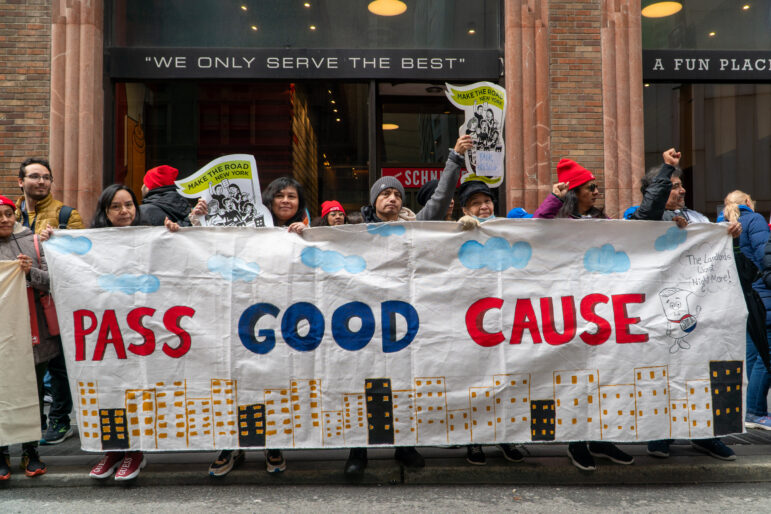
Chris Janaro
Faham-Selzer likened the Good Cause law to the Housing Stability and Tenant Protection Act (HSTPA), a multi-part 2019 law that made it more difficult for landlords to exit rent stabilization, a separate long standing regime that puts a hard cap on annual rent adjustments for about 1 million New York City apartments.
“We litigated the HSTPA to figure out what the law should be interpreted as, we’re still litigating it to this day, and I think the same thing is going to happen here,” she said.
In the meantime, she’s urging her clients to inform tenants of their Good Cause coverage status, before the notice rules officially kick in: “If my clients are drafting leases today they’re adding them onto leases today.” Tenants who believe they are covered by Good Cause but are nervous about how to proceed should start talking to their neighbors, said Esteban Girón, an organizer with the Crown Heights Tenant Union.
“When you’re acting as one unit, just like if you’re doing collective bargaining with labor [unions], you can share information,” he said. “You can have a lawyer come in and talk to your whole building.”
This moment is both exciting and frustrating for tenants who can now fight large rent hikes for the first time, according to Girón.
“I think there’s potential for a sort of budding of a new phase of the tenant movement,” he said. But facing a large rent increase that’s “presumed” unreasonable—even though a judge could be convinced otherwise—isn’t as reassuring or straightforward as an explicit maximum allowable adjustment, which is what stabilized tenants get.
The language in the law—“it shall be a rebuttable presumption that the rent… is unreasonable”—just “doesn’t sound as sexy as a right,” Girón said.
To reach the reporter behind this story, contact [email protected]. To reach the editor, contact [email protected]
Want to republish this story? Find City Limits’ reprint policy here .
Latest articles
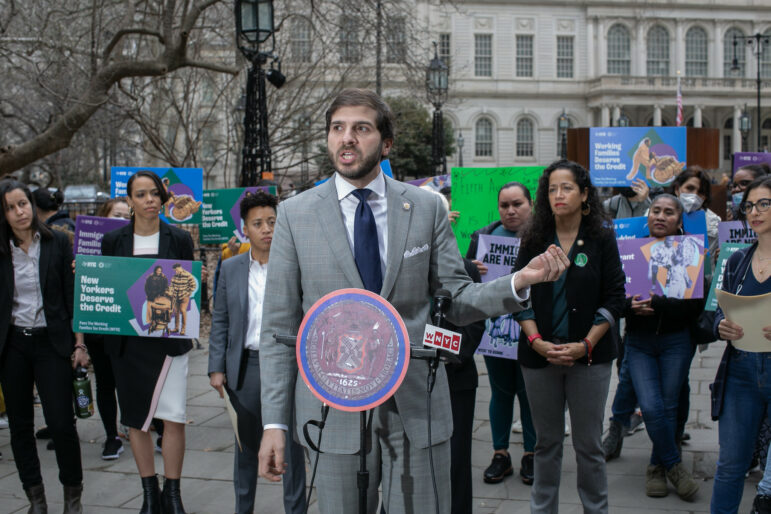
Presupuesto estatal incluye crédito tributario por hijos, pero defensores advierten oportunidad perdida para combatir pobreza
By daniel parra.
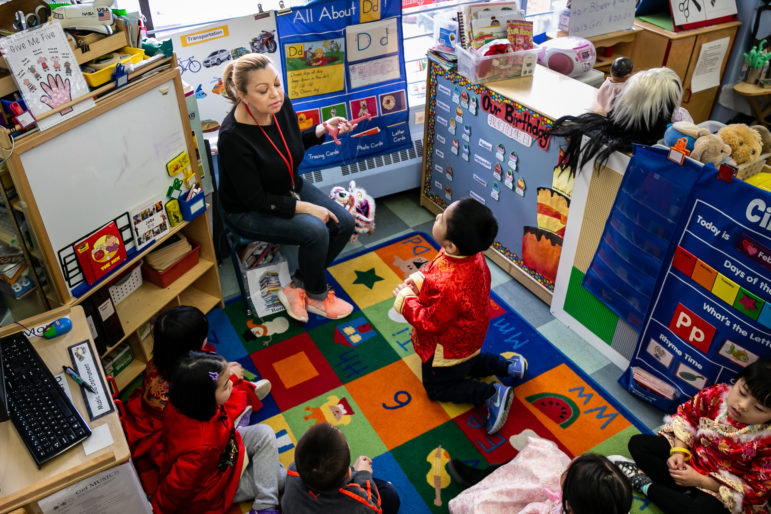
Opinion: NYC Can Give the Perfect Gift This Mother’s Day—Investing in Universal Child Care
By talya wolf.

Can Curbing CUNY’s Carbon Footprint Help Tackle Its Maintenance Problems?
By mariana simões.
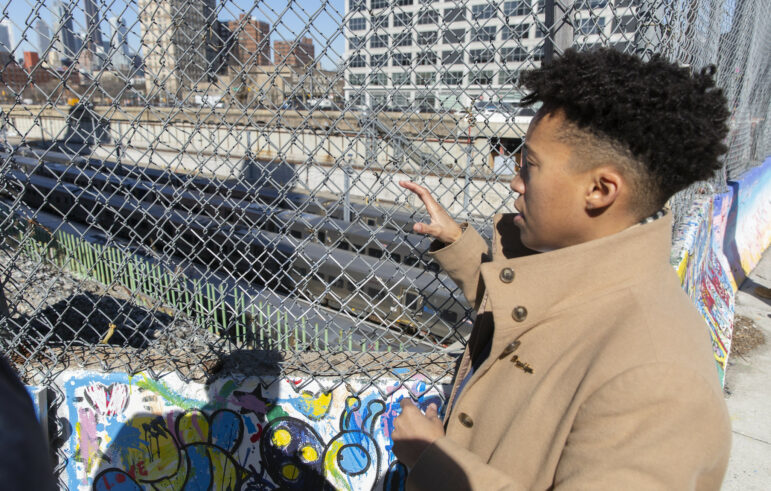
Building in Brooklyn Council District 35? Here’s What the Rep—And Community Members—Want in New Development
By chris janaro.

Opinion: Securing the Future of New York’s Supportive Housing
By pascale leone, more stories:, leave a reply cancel reply.
Your email address will not be published. Required fields are marked *
City Limits uses investigative journalism through the prism of New York City to identify urban problems, examine their causes, explore solutions, and equip communities to take action.
Founded in 1976 in the midst of New York’s fiscal crisis, City Limits exists to inform democracy and equip citizens to create a more just city. The organization is a 501(c)(3) nonprofit funded by foundation support, ad sponsorship and donations from readers.
- Our Standards
- Reprint Policy
- NYC Tool Kit
- Funding Partners
- Get Involved
- Privacy Policy
- Housing & Development
- Health & Environment
- Politics & Government
- Immigration
- Transportation
- Max & Murphy
- The Check In
- El Diario Sin Limites
- About CLARIFY
© Copyright 2024, City Limits

Newsletters
- Mapping the Future
- City on the Edge
- Una Ciudad sin Limites

- Investigations
- Special Projects
Support City Limits
Support local, investigative journalism that has informed and empowered New Yorkers for 45 years.
- Become a member
- Our Supporters
- Annual Report
AskEasy: AI ChatBot Assistant 12+
Ask chat bot・your 24/7 helper, zilingial limited, designed for iphone.
- #63 in Productivity
- 4.7 • 18.5K Ratings
- Offers In-App Purchases
iPhone Screenshots
Description.
AskEasy: simplify your life with a smart assistant! Looking for a good recipe to surprise your guests? Need ideas for a birthday party? Or some help with writing an essay or composing a resume? Simply open the app and ask! AskEasy is a real lifesaver. It finds answers to any questions, generates texts and brainstorms ideas, helps with daily tasks, proofreads and improves your content, and even acts as a fun empathetic friend always open for a chat! All you need to do is just type in your request and see how an accurate answer magically appears on your screen! What sets this app apart are its four most powerful chat models: GPT 3.5, GPT 4, Llama 2, and Gemini. These cutting-edge AI technologies ensure that you can easily choose the model that best meets your specific needs, providing tailored, intelligent responses in real-time. Have questions about a YouTube video? Or need a short summary of a video instead of watching it whole? Now, you can simply paste the video link and ask away. Our chatbot will answer your questions based on the video content and provide a concise summary of it. Need to create unique visuals for your project? Go to Image Generator and get inspiring images generated by AI in seconds! All you have to do is just to type in the text description – and see how it magically transforms into images. Moreover, you can easily get creative captions, tags and stories based on your images by using the Text to Image tool. AI understands and interprets the context and emotions of your photos, and brings the ideas of creative texts that will enhance your social media presence. With """"Upload & Ask,"""" you have the power to directly upload a PDF document and effortlessly ask questions about its content. This feature deciphers the text, providing you with precise answers and insights without the need for manual searching or reading. Meanwhile, """"Ask by Link"""" offers an equally innovative capability where you can insert a link to a web page and receive answers derived from its content. Whether it's a detailed explanation, summary, or specific information, this feature ensures you get the answers you need quickly and efficiently. Your creativity is your only limit! Experiment with your queries to discover everything the chatbot can do for you, and you will be amazed by the mind-blowing results: - Choose the chat model (GPT 3.5, GPT 4, Llama 2, or Gemini) to solve your tasks quickly and efficiently - Write anything: from tweets, email responses, and ad copies to essays, poems, and creative stories - Brainstorm ideas: new recipes, movie and song recommendations, places to go, party ideas, etc. - Check and improve your writing - Simplify your texts by summarizing them - Insert a link to YouTube video and ask your questions based on it - Get quick and concise summary of a video on YouTube - Get AI-generated images from your word description - Transform any text into visually captivating quotes - Generate captivating captions, relevant tags, or stories for your pics - Create original jokes and holiday greetings - Translate texts into other languages or even into programmatic commands - Use it for analytics and business intelligence - Get prepared for an exam or job interview - Or simply check out your daily horoscope! Features: - Smart chat for iPhone - GPT 3.5, GPT 4, Llama 2, and Gemini support - Spell and grammar check - Images Generator - Quote Maker - Text for Image - “Ask by Link” and “Upload & Ask” features - Ask Youtube and Youtube Summary - Text writing and facts search - History of your queries - CV and social profile builder - Clear and smart design - Simple and blazingly fast to use Privacy Policy Url - https://mychat-ai.cloud/pp Term Of Use Url - https://mychat-ai.cloud/tou Support Address - [email protected]
Version 2.1
Why update the app that already works great? To get the most out of it, of course! The benefits of the new version: —Flawless bug-free experience —Improved user interface and app's navigation Your positive reviews in the App Store will inspire us to new achievements!
Ratings and Reviews
18.5K Ratings
Ok so I have a problem
The concept of having ai write you a story is amazing. The stories are amazing. But, what good is it if it doesn’t give an ending. It doesn’t have to be long to end well. But it leaves you hanging. Not a fan of that. Especially since I paid for it UPDATE: ok, so I changed most review from three stars to 5z mainly because regardless of if the story ends or not, I’m able to end it myself quite well. I enjoy the app and it helps me a lot in my work
Developer Response ,
Dear Juliabrown1966!!!!!Thank you for your feedback. We apologize for the inconvenience caused and we understand your frustration with the limitations you've encountered in the application. The application has certain restrictions in place due to server limitations and the significant computing resources required for advanced AI technology like GPT-4. These limitations are in place to ensure the app's performance and availability for all users. We have increased the limit of characters to the maximum allowed from GPT itself and we cannot go beyond it. Thank you for understanding. Warmest regards, AI ChatBot: Smart Assistant Support Team
Not as described
Right after installing presented programs not functioning, i didn’t get try all, with in two minutes was forced to rated with 5 stars if i was too quick to press buttons. I didn’t even get to read what was the gpt’s response to me but as it was typing things really fast noticed everything being typed was flickering like screen power is too low. Remember after 3 days i trial you will be charged automatically. This look good but just like most of them, taking a freeware altering in some cases not much from the original and start chasing the money with tricks and dancing around the truth with lies. I think today’s browsers gpt is good as most of these tricksters version unless you need a serious one for school or work then I suggest getting a real one pay a few more dollars than what these people are asking and have a real one, if that’s not the case stick with ones as browsers add on is my opinion.
Dear User! We are very grateful to you for taking the time to leave us a review. We consider a customer-centric approach and always put ourselves in our customer’s mind. That way, we can align the learning experience with their expectations and improve our application. We will definitely take into account the fact that the users need more time to evaluate the application and will not force them to rate the app too quickly. We have our users' best interests at heart and will continue to work tirelessly to better ourselves and our application. Best regards, AI ChatBot: Smart Assistant Support Team
Concern over longevity
I have tried numerous AI Assistants. And this one, by far, is my favorite. I even went so far as to opt in for paying for full features. However, as an assistant or even aid, it is limited and out dated. When querying about the up-to-date information it could provide me, my assistant informs me that it is only as up-to-date as 2021. So, I queried about when the databases may be updated. And there was no information on that. The databases are already years behind and this is concerning. I didn’t pay to have something that can’t actually do as it is alleged to be able to perform. I can google and get more current information.
Dear Crashed and Lost! Thank you for your feedback and for choosing our AI ChatBot as your favorite assistant. We apologize for any inconvenience caused by the limitations of the up-to-date information provided. We are constantly working on improving our databases and ensuring the latest information is available. But as we use the official open AI api and their system is based on data up to 2021, the assistant informs you that it is only as up-to-date as 2021. Best regards, AI ChatBot: Smart Assistant Support Team
App Privacy
The developer, Zilingial Limited , indicated that the app’s privacy practices may include handling of data as described below. For more information, see the developer’s privacy policy .
Data Used to Track You
The following data may be used to track you across apps and websites owned by other companies:
- Identifiers
Data Not Linked to You
The following data may be collected but it is not linked to your identity:
- Diagnostics
Privacy practices may vary, for example, based on the features you use or your age. Learn More
Information
English, French, German, Italian, Japanese, Korean, Portuguese, Simplified Chinese, Spanish, Traditional Chinese
- AI ChatBot: 1 Week Access $7.99
- AI ChatBot - 1 Week Access $7.99
- AI ChatBot: Access for 1 Year $49.99
- AI Chat Bot: Weekly Access $7.99
- AI ChatBot: 1 Week Access $4.99
- AI Assistant - 1 Month $19.99
- AI ChatBot for 1 Year $19.99
- AI ChatBot: 1 Year Access $49.99
- AI Helper for 1 Week $4.99
- AI ChatBot: 1 Year $39.99
- Developer Website
- App Support
- Privacy Policy
More By This Developer
AI Wallpapers & Widgets - Flex

IMAGES
VIDEO
COMMENTS
I believe in saving for a rainy day. I believe in investing in oneself. I believe in the saying, "money doesn't grow on trees.". I believe that rich people should be forced to pay more taxes. These 50 I Believe essay topics are sure to inspire your own original beliefs and help you create a powerful and unique essay.
Explore. Featured Essays Essays on the Radio; Special Features; 1950s Essays Essays From the 1950s Series; Browse by Theme Browse Essays By Theme Use this feature to browse through the tens of thousands of essays that have been submitted to This I Believe. Select a theme to see a listing of essays that address the selected theme. The number to the right of each theme indicates how many essays ...
"This I Believe" essays are a popular genre in the academic and personal writing world. They allow individuals to reflect on their beliefs, values, and experiences in a concise and engaging manner. If you're looking for some inspiration for your own "This I Believe" essay, here are 101 topic ideas and examples to get you started:
How To Write A "This I Believe Essay" Now that you have these topics, the next thing to get is the structure: title, introduction, body paragraphs, and conclusion. Make sure you go straight to the point and cut out unnecessary words. Conclusion. With these essay topics, you are on the right path to writing a good "this I believe" essay.
I never did my homework and it became so hard for me to catch up with the rest in class. This was the time when I remembered the words of my grandmother "only fools rush […] This I Believe: Happiness Is a Choice. I know that I can choose to be happy. I was ashamed and worried that he would know I took it. We will write.
Also, the teaching strategies for the "This I Believe" essays are also very useful because students can follow methods. Students will be "guided to prepare their own personal philosophies and to place them into dialog with wider public contexts and dialogue". 2. Section 1: Personal Values and Beliefs.
This I Believe Essay Examples. How to write a This I believe essay? To better understand the This I believe statements format and get inspired, you can read some exemplary essays from the project. This project, initiated by Edward R. Murrow in the 1950s and revived by National Public Radio (NPR), encourages individuals to share their personal beliefs in concise essays.
This I Believe Beginning in 1951, radio pioneer Edward R. Murrow asked Americans from all walks of life to write essays about their most fundamental and closely held beliefs. Half a century later ...
This I Believe Essay Topics. Instructor Clio Stearns. Clio has taught education courses at the college level and has a Ph.D. in curriculum and instruction. Cite this lesson. Getting students ...
This I Believe is an exciting media project that invites individuals from all walks of life to write about and discuss the core beliefs that guide their daily lives. They share these statements in weekly broadcasts on NPR's Morning Edition and All Things Considered. The series is based on the 1950's radio program This I Believe, hosted by ...
Out of many, seven This I Believe essays stood out to a reading committee made up of students, faculty, and staff. This I Believe is a popular essay genre that allows the writer to share a personal belief and, through a narrative, explain that belief's origin or a time that belief was put into action. The essay genre started in the 1950s on a ...
Essays. 00:00. 00:00. In first grade, I took a spelling test with the word "of" on it. O-F. Of. My guess is that every student in the class that day spelled the word correctly; every student except for Malcolm, the slowest in the class. As I looked over at his test, I saw that he had spelled the word U-V. "Uv.".
In this article, we will delve into the definition of a This I Believe essay, present a step-by-step guide on how to craft one, address common questions, and explore the essence of this expressive form. 1. High School This I Believe Essay Example. misswrighteng9.weebly.com. Details. File Format. Size: 487 KB. Download.
To help you get started, we are going to list 22 hot this I believe essay ideas for you. Go ahead and pick the one you prefer or tweak them to suit your preference. I believe in having a lot of fun in and out of school. I believe in using a mentor to build a career. I believe in using advanced technology for learning.
Explore. Featured Essays Essays on the Radio; Special Features; 1950s Essays Essays From the 1950s Series; Browse by Theme Browse Essays By Theme Use this feature to browse through the tens of thousands of essays that have been submitted to This I Believe. Select a theme to see a listing of essays that address the selected theme. The number to the right of each theme indicates how many essays ...
Here's the prompt I used: This I Believe. For 2 minutes: List words or ideas that you think about when you think of YOUR LIFE. (Can be feelings, symbols, names, events, etc.) After students generated this list, I asked them to consider what they wanted to write about and share with others.
Check out our helpful list of argumentative essay topics, plus tips on picking the best one for you. Call Direct: 1 (866) 811-5546 ... Sometimes you may find yourself arguing things you don't necessarily believe. ... if you have free choice of topic, it's a good idea to pick something you feel strongly about. There are two key components to ...
List of 113 Good Persuasive Essay Topics. Below are over 100 persuasive essay ideas, organized into ten categories. When you find an idea that piques your interest, you'll choose one side of it to argue for in your essay. For example, if you choose the topic, "should fracking be legal?" you'd decide whether you believe fracking should ...
Once you've chosen a general topic to write about, get out a piece of paper and get to work on creating a list of all the key details you could include in your essay. These could be things such as the following: Emotions you felt at the time. Names, places, and/or numbers. Dialogue, or what you or someone else said.
112 Engaging Persuasive Speech Topics. Tips for Preparing Your Persuasive Speech. Writing a stellar persuasive speech requires a carefully crafted argument that will resonate with your audience to sway them to your side. This feat can be challenging to accomplish, but an engaging, thought-provoking speech topic is an excellent place to start.
Mission. The Purdue On-Campus Writing Lab and Purdue Online Writing Lab assist clients in their development as writers—no matter what their skill level—with on-campus consultations, online participation, and community engagement. The Purdue Writing Lab serves the Purdue, West Lafayette, campus and coordinates with local literacy initiatives.
Consider moments when your belief was formed, tested, or changed. Make sure your story ties to the essence of your daily life philosophy and to the shaping of your beliefs. Be brief: Your statement should be between 350 and 500 words. The shorter length forces you to focus on the belief that is central to your life.
Produced by Nina Feldman , Clare Toeniskoetter and Rikki Novetsky. Edited by Liz O. Baylen. Original music by Marion Lozano , Elisheba Ittoop and Dan Powell. Engineered by Alyssa Moxley. If and ...
Explore. Featured Essays Essays on the Radio; Special Features; 1950s Essays Essays From the 1950s Series; Browse by Theme Browse Essays By Theme Use this feature to browse through the tens of thousands of essays that have been submitted to This I Believe. Select a theme to see a listing of essays that address the selected theme. The number to the right of each theme indicates how many essays ...
This year, it's $5,846 for a studio, $6,005 for a one-bedroom, $6,742 for a two-bedroom, $8,413 for a three-bedroom, and $9,065 for a four-bedroom. Adding another wrinkle, even though the law took effect April 20, landlords aren't obligated to notify tenants if they're covered by Good Cause—in paperwork accompanying leases and housing ...
Since we began the This I Believe project in 2005, more than 150,000 people have submitted their stories to us via our website, and more than 70% of them —almost 112,000 essays— have come from young people, aged 13 to 24. In addition, 61% of our web visitors are under 34, with 28% under 18. Click here to read testimonials from youth who ...
- Write anything: from tweets, email responses, and ad copies to essays, poems, and creative stories - Brainstorm ideas: new recipes, movie and song recommendations, places to go, party ideas, etc. - Check and improve your writing - Simplify your texts by summarizing them - Insert a link to YouTube video and ask your questions based on it